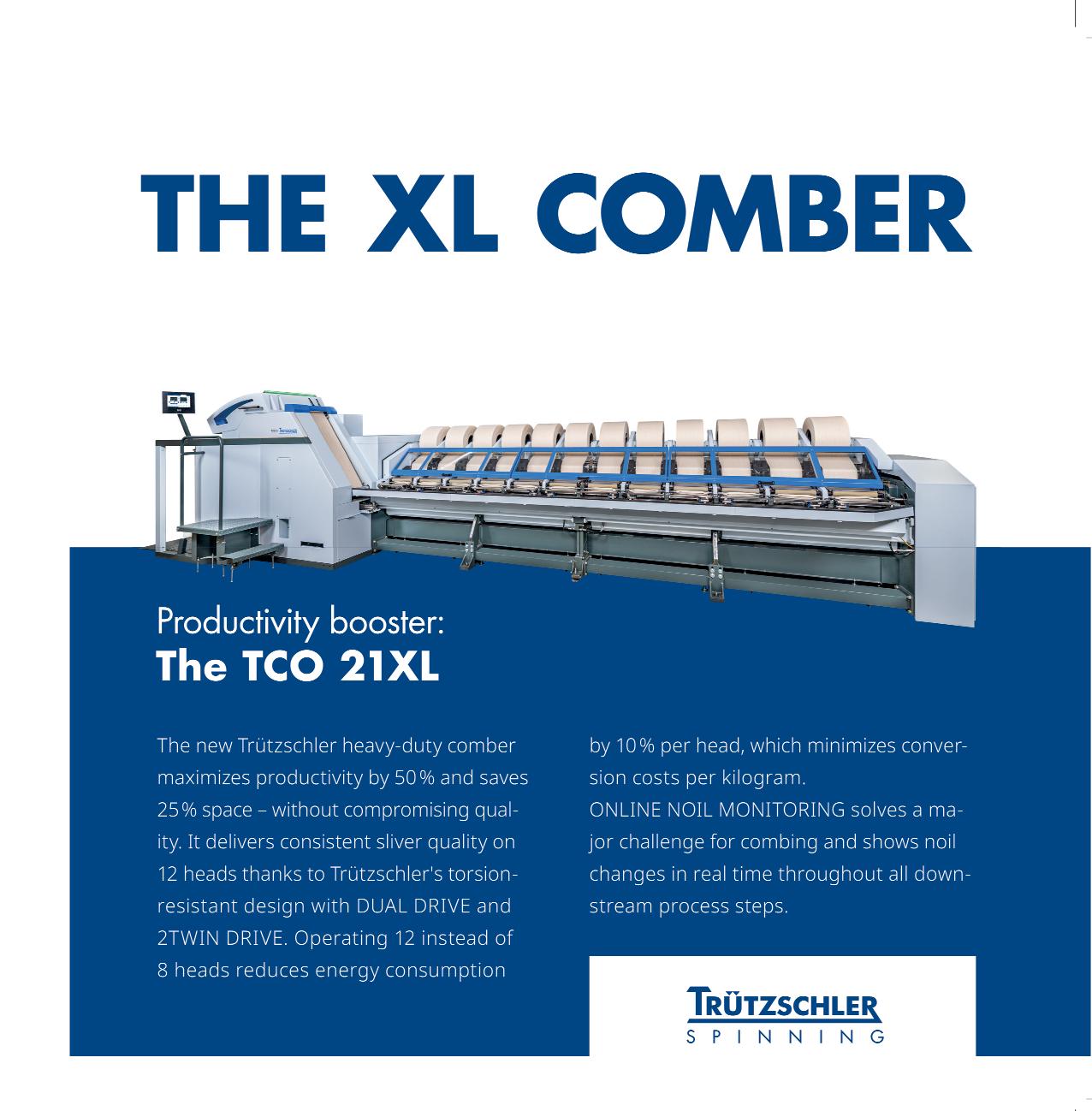

Established 1951 May 2023 German Review / ITMA 2023 Preview


Techtextil 2023 North America
Dates: May 10th to 12th, 2023
Venue: Georgia USA.
DOMOTEX asiaCHINAFLOOR 2023

Dates: May 29th to 31st 2023.
Venue: NECC, Shanghai, China.
FESPA 2023

Dates: May 23rd to 26th 2023.
Venue: Munich, Germany.
Istanbul Yarn Fair

Dates: June 1st to 3rd, 2023.
Venue: Istanbul, Turkey.
ITMA 2023
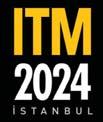
Dates: June 8th to 14th, 2023.
Venue: Milan, Italy.
Johannesburg, South Africa !
Dates: June 18th to 20th, 2023.
Venue: Gallager Convention Centre.
The 92nd Textile Institute World Conference, UK.

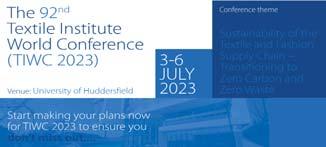
Dates: July 3rd to 6th 2023.
Venue: Huddersfield, UK.
62th Dornbirn GFC Global Fiber Congress


Dates: September 13th to 15th 2023.
Venue: Dornbirn Austria.
Textile Asia 2023, Lahore
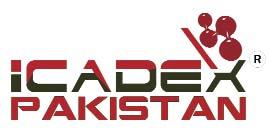
Dates: October 13th to 15th 2023.
Venue: Expo Centre, Lahore.
ITMA ASIA + CITME 2023

Dates: November 19th to 23rd, 2023.
Venue: NECC, Shanghai, China.
Heimtextil 2024, Frankfurt
Dates: January 09th, to 12th, 2024
Venue: Frankfurt am Main.
IGATEX



Pakistan 2024, Lahore
Dates: May 1st to 4th 2024.
Venue: Expo Centre, Lahore.
iCADEX
Pakistan 2024, Lahore
Dates: May 1st to 4th 2024.
Venue: Expo Centre, Lahore.
ITM 2024
Dates: June 4th to 8th, 2024.
Venue: Istanbul, Turkey.
HIGHTEX 2024

Dates: June 4th to 8th, 2024.
Venue: Istanbul, Turkey.
JIAM 2024 OSAKA
Dates: Nov. 27th to Nov. 30th 2024.
Venue: Osaka, Japan.
DOMOTEX Hannover 2024


Dates: January 11th to 14th 2024.
Venue: Hannover, Germany.
12th
ITME INDIA 2024

Dates: December 2024.
Venue: India Expo Centre & Mart. Noida, India.

2
Calendar of Events
PAKISTAN TEXTILE JOURNAL - May 2023
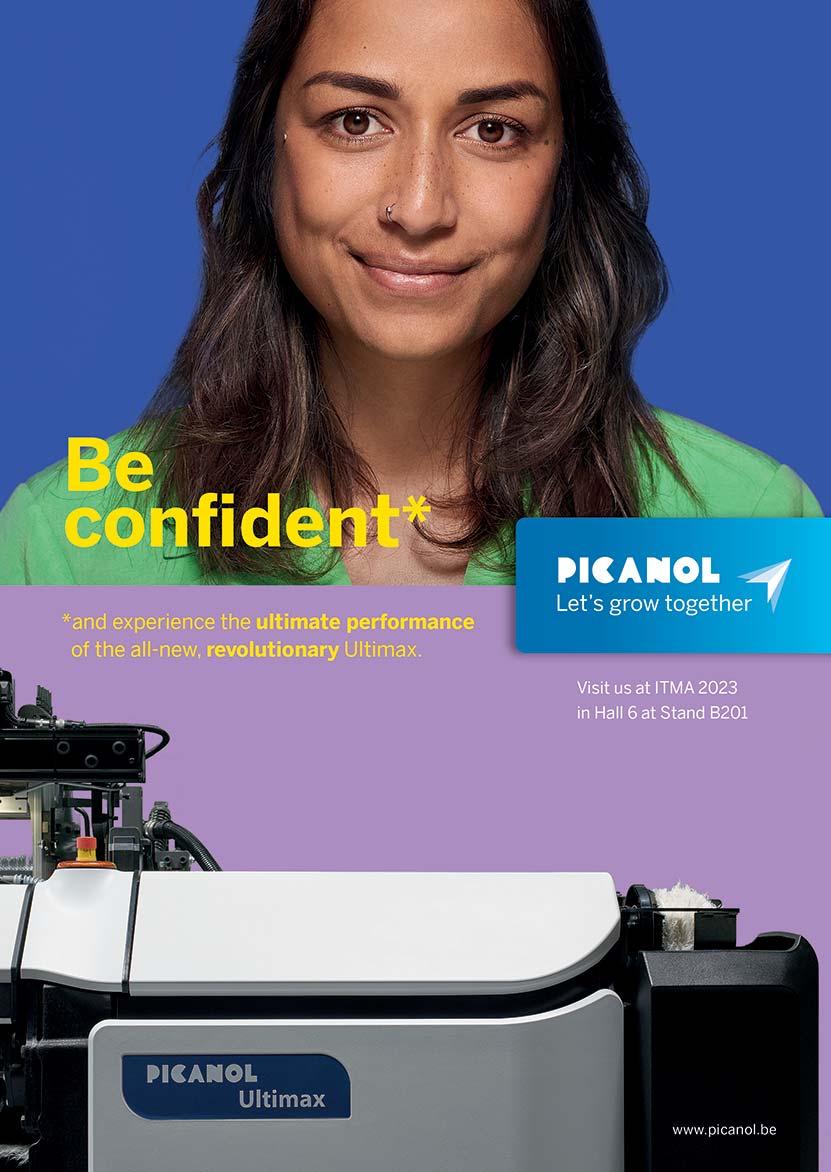
Founded in 1951 by Mazhar Yusuf (1924-2009)
Publisher
Nadeem Mazhar
Editor in Chief
Amina Baqai
Associate Editor
Nimrah Nadeem
Production Manager
Mazhar Ali
Hony-Editorial Board







Dr. Hafizur Rehman Sheikh
Ph.D (UK) F.T.I. (UK)
Syed Mahfooz Qutab
C.TEX, F.T.I (U.K), B.Sc.
Fellow I.C.T.T Atlanta, GA; (USA)
Mian Iftkhar Afzal
B.S.N.C State, M.Sc. (Leeds)
C.TEXT.F.T.I (UK)
Dr. Zubair Bandukda
PhD (Textiles), CText ATI
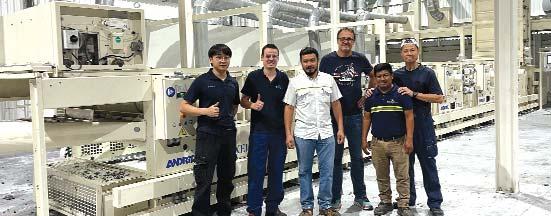

Editorial & Advertising Office
B-4, 2nd Floor, 64/21, M.A.C.H, Miran M. Shah Road, Karachi - Pakistan
Tel: +92-21-34311674-5
Fax: +92-21-34533616
Email: info@ptj.com.pk
URL: http://www.ptj.com.pk








PTJ Europe Ltd.


Correspondence & Mailing address: 93 Fleming Place, Bracknell, RG12 2GN, United Kingdom



Tel: +44 792 2228 721
Registered Office: Dairy House, Money Row Green, Holyport, Maidenhead, Berkshire, SL6 2ND, UK
Registered no. 09141989
AROUND THE WORLD . . . . . . . . . . . . . . . . . . . . . .14 NEWS & VIEWS . . . . . . . . . . . . . . . . . . . . . . . . . .10 EDITOR’S PAGE . . . . . . . . . . . . . . . . . . . . . . . . . . .7 German Textile Machinery: A seven-decade commitment to Pakistan's textile industry TEXTILE BRIEFS . . . . . . . . . . . . . . . . . . . . . . . . . . .8 Vol. LXXII No. 05 May 2023 Rs. 565.00
Printed at: Color Plus Korangi, Karachi. Published by Nadeem Mazhar from D-16, K.D.A. Scheme No.1. Karachi. Available on Gale and Factiva affiliated international databases through Asianet Pakistan
NEWS ANDRITZ: Novafiber starts
& airlay lines from ANDRITZ . . . .18 VDMA: Way2ITMA . . . . . . . . . . . . . . . . . . . . . . . . . . . . . . . . . . . . . . . . . . . .20 New set-up of Mayer & Cie. representation in Bangladesh and Nepal . . . . . . . .21 FEATURES The edie23 highlights the importance of data & transparency in sustainability .26 Earth Protex Corporation partners with iTextiles® . . . . . . . . . . . . . . . . . . . . .28 FAIRS AND EXHIBITIONS Texworld Paris celebrates 25 years! . . . . . . . . . . . . . . . . . . . . . . . . . . . . . . .22 Heimtextil 2024: Demand exceeds exhibitor number of previous event . . . . . .24 DYES AND CHEMICALS Archroma puts sustainability in the spotlight at Bangladesh Denim Expo 2023 . .34 18 MILL REPORT SSM: Irreproachable Quality with XENO-AC . . . . . . . . . . . . . . . . . . . . . . . . . .30
HINTS Atlas Copco's tips on how to size pneumatic conveying systems . . . . . . . . . . . .32
CORPORATE
up textile recycling
PRACTICAL
GERMAN REVIEW + ITMA 2023

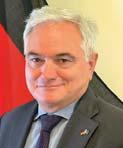
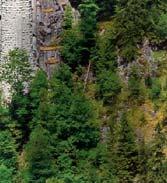
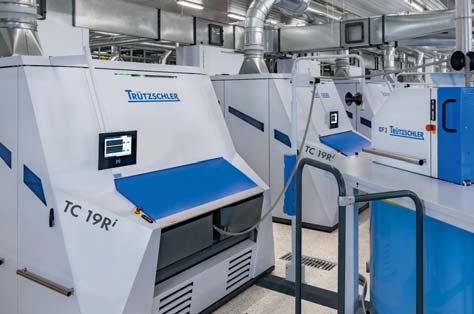






Pakistan-Germany Trade: A Fruitful and Growing Partnership . . . . . . . . . . . . . .36 Contribution of German Machinery in the World of Textiles . . . . . . . . . . . . . . .40 Sustainable & innovative solutions are building blocks of a quality product . . . .42 Latest machines & technologies from the Trützschler Group . . . . . . . . . . . . . .44 Monforts displays Montex®Coat coating unit . . . . . . . . . . . . . . . . . . . . . . . . . .46 Weko & RotaSpray to exhibit at ITMA Milan in June . . . . . . . . . . . . . . . . . . . . . . . . .48 New Accotex Aprons: Field tests confirm high Performance . . . . . . . . . . . . . . . . . . .50 AUTEFA Solutions: Pioneer in sustainability with innovative solutions . . . . . . . . . . . .51 Oerlikon with world premieres at ITMA Milan 2023 . . . . . . . . . . . . . . . . . . . . . . . . .52 Erhardt+Leimer: New inspection technologies for improved production processes . . .54 Groz-Beckert presents its highlights and innovations . . . . . . . . . . . . . . . . . . . . . . . .55 PLEVA showcases technology for energy-efficiency processes . . . . . . . . . . . . . . . . . .56 KARL MAYER GROUP mastering the future with sustainability . . . . . . . . . . . . . . . . . .58 DiloGroup: MicroPunch line . . . . . . . . . . . . . . . . . . . . . . . . . . . . . . . . . . . . . . . . . .59 SETEX is shaping the future of Industrial Automation . . . . . . . . . . . . . . . . . . . . . . . .60 Mahlo highlights latest developments for process optimization . . . . . . . . . . . . . . . . .61 Thies: Signature technology transforms dyeing . . . . . . . . . . . . . . . . . . . . . . . . . . . .62 KERN-LIEBERS Textile at ITMA-2023 . . . . . . . . . . . . . . . . . . . . . . . . . . . . . . . . . . . .63 42 46 44 50 55 36 62
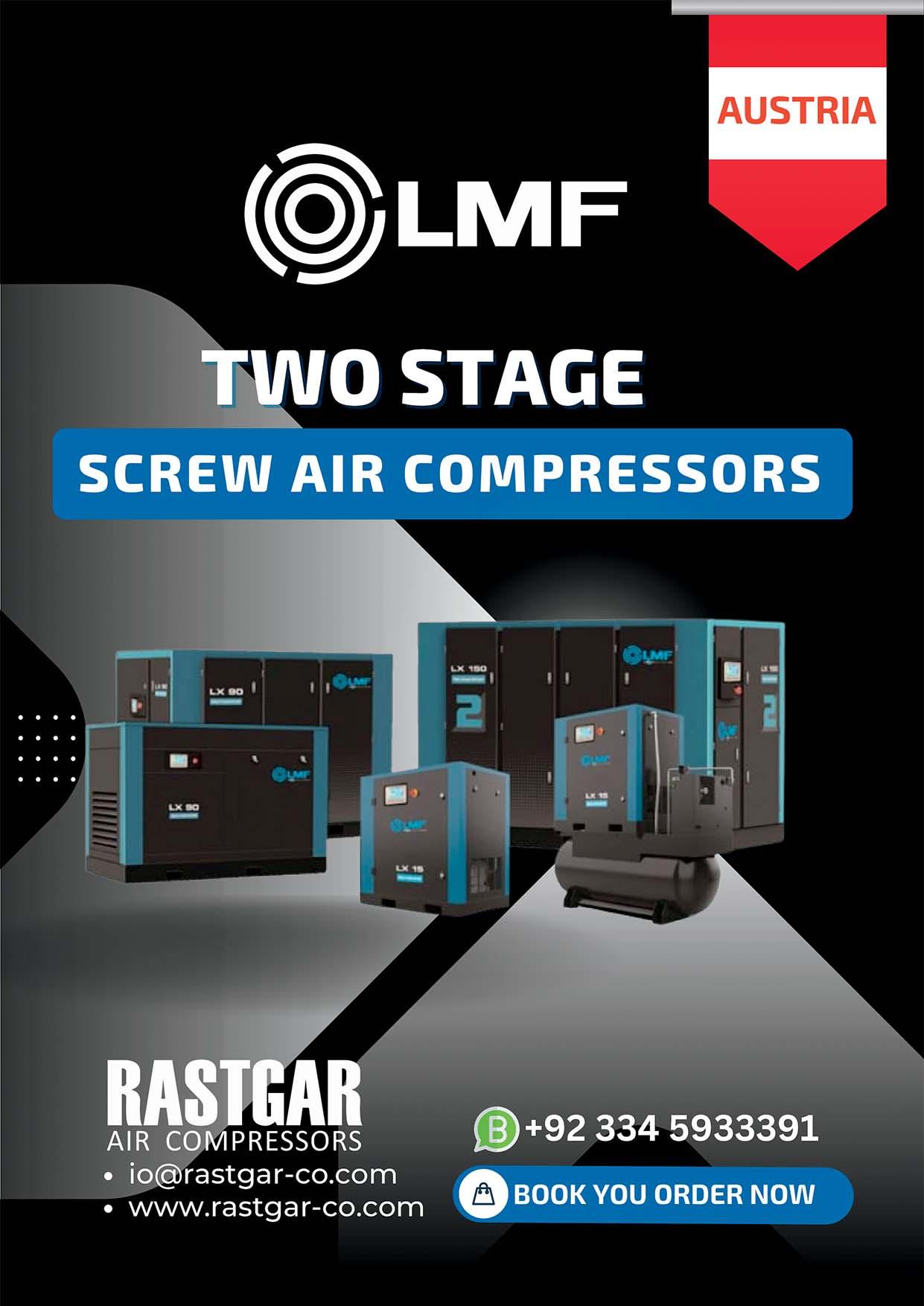
German Textile Machinery: A seven-decade commitment to Pakistan's textile industry

Pakistan's textile industry has thrived over the years, and its success owes a great deal to the innovative technological solutions provided by German textile machinery suppliers. The strong foundation of the Pakistani textile industry can rightfully be attributed to the technological prowess of German companies. Pakistani textile entrepreneurs and industrialists have embraced the acquisition of cutting-edge global technology to remain competitive in the global textile market.
German textile machinery suppliers have played a pivotal role in the development of Pakistan's textile industry. Companies and brands such as Schlafhorst (Saurer Group), Suessen (Rieter Components), Truetzschler, Dornier, Monforts, Osthoff-Senge, Goller, Brueckner, Thies, Groz Beckert, Mayer & Cie, Stoll, and Karl Mayer have been instrumental in shaping the textile sector in Pakistan. These companies have not only provided state-of-the-art machinery but have also demonstrated a strong commitment to the Pakistani market through extensive after-sales support.



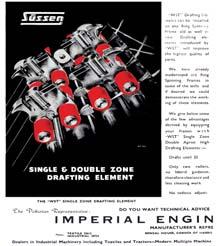


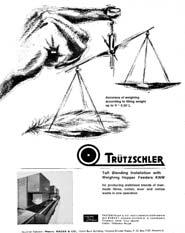

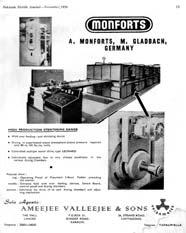

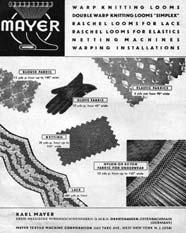





Furthermore, the contribution of German chemical suppliers cannot be overlooked. Companies like Bayer, CHT, DyStar, and many others have been reliable partners, supplying quality chemicals and auxiliaries to Pakistan's textile finishing industry. With the increasing demand for sustainable and eco-friendly textiles, the role of chemical suppliers has become even more vital. These companies have not only provided suitable chemicals but have also played a crucial role in educating the Pakistani textile industry on techniques to achieve sustainable and profitable production.
Pakistan Textile Journal has been a key medium for German companies to engage with and address the rapidly evolving textile industry in Pakistan for over six decades. Some of the earliest advertisers in our publication are still actively present, demonstrating their long-term commitment to the Pakistani market. The journal has witnessed the growth of Pakistan-Germany trade relations through thick and thin, and continues to serve as a platform for disseminating valuable information and promoting industry advancements.
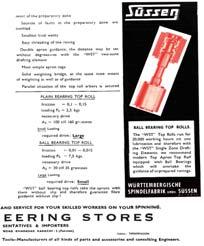
In these challenging times for the Pakistani textile industry, German companies have an opportunity to demonstrate their support and solidarity with their customers. By providing guidance and support, German companies can assist the Pakistani textile industry in navigating new challenges and diversifying into new areas. With their expertise and technological advancements, German companies are well-positioned to guide Pakistan's textile industry towards sustainable growth and profitability.
As the Pakistan-Germany trade partnership in the textile industry continues to evolve, it is crucial for both countries to foster open lines of communication, encourage collaborations, and create a conducive business environment. Through mutual cooperation and shared knowledge, Pakistan and Germany can further strengthen their trade ties, driving innovation, productivity, and sustainable development in the textile sector.
The Pakistan Textile Journal remains committed to promoting the PakistanGermany trade relationship and serving as a reliable source of information for the textile industry. We look forward to the continued collaboration between Pakistani and German companies, driving progress and prosperity in the textile sector for years to come.


7 Established 1951 May 2023 German Review ITMA 2023 Preview
EDITOR’S PAGE
May 2023.
Schlafhorst (PTJ 1956).
Monforts (PTJ 1956). Truetzschler (PTJ 1964).
Karl Mayer (PTJ 1958).
Suessen (PTJ 1956).
1Pakistan Hosiery Manufacturers & Exporters Association (PHMA) asked the Federal Board of Revenue to speed up releasing value-added knitwear industry’s sales tax refunds to help ease up its cash flow, especially for wages to its workers. 2
The exporters are complaining about the inordinate delays in the payment of sales tax refund claims, as the government has stopped releasing all the sales tax refund claims. Thus exporters’ precious liquidity worth billions is compromised, stated Naseer Butt Chairman PHMA North Zone.
3
Mr. Sohail Nisar, Senior Vice Chairman, of Pakistan Yarn Merchants Association (PYMA) earlier this month rejected the recent hike in electricity and gas tariff, and protested against this antibusiness and anti-industry initiative. 4
The Senior Vice Chairman raised concern that in such circumstances, an increase of more than 400 percent in electricity and gas tariff would increase the cost of doing business to an unbearable extent, having disastrous effects on the industries and domestic exports.
Textile Briefs International
1
Bangladesh is the second largest readymade garments exporter in the world but the country’s own fashion industry is suffering due to lack of government support among other factors. Maheen Khan founder-president of the Fashion Design Council of Bangladesh while sharing her concerns said, “Lack of proper planning, work environment, investment, and policy support is the main hurdle for local fashion producers.”
from child labor in China. Mei Feng, chairman of the National Advanced Functional Fiber Innovation Center said his organization will collaborate with all parties to develop China’s recycled fibre industry. He was confident that the platform will function well and promote the high-quality development of the textile industry.
3

China has launched a new digital platform to help identify and trace textile products throughout the supply chain. Possibly to address the concerns of Western buyers on the use of cotton produced allegedly

2
The Hong Kong Research Institute of Textiles and Apparel Limited (HKRITA) and The International Iberian Nanotechnology Laboratory (INL) signed a Memorandum of Understanding with the intention of exchanging knowledge about wearable technology and fostering developmental research.
The 4th International Textile Exhibition, also called TEXPO 2023 attracts textile industries all over the world with many industries leaders already committed to visit TEXPO during May. Among which China who is one of the industry leader worldwide has shown a keen interest in the TEXPO as more than 100 Chinese companies has shown interest and made commitment to visit it next month. 6
5
price for cotton is to be fixed at Rs 8,500 per 40kg to give relief to farmers, so that they can begin to cultivate more and more cotton as soon as possible. 7
Mr. Iftikhar Ali Sahu, Secretary of Agriculture, Punjab, at a recent high-level meeting announced that the support
Hugo Boss has signed the Pakistan Accord, underscoring its commitment to the protection of health and safety of garment workers. “At Hugo Boss, we are committed to respecting human rights and safe working standards along our entire value chain and apply this throughout our organization,” said Yves Müller, CFO and COO of Hugo Boss.
4Continuous poor demand for cotton yarn in the local Weaving Industry and global market has started having negative effects on cotton prices throughout India. Many Weaving plants within the country are halting production for 2 -3 days every week because the poor demand has put pressure on the entire value chain and the entire market is facing a payment crisis.
Wash Lab was successfully launched on 20th April 2023 after facing a delay since 2020 because of the global pandemic and other related factors.
6
The University of London and Denim leader Lane Ateliers have launched what they are claiming to be the country’s first state-of-the-art sustainable Research and development washing facility. The sustainable R&D Denim
With the global decline of demand for textiles, the US has also seen a decline in the imports of its textile and apparel industry with Apparel imports declining by 19.7%, while nonapparel imports decreased by 20.7% in the first three months of 2023.
5
7
Vietnam’s exports to the Association of Southeast Asian Nations (ASEAN) hit $10.85 billion in the first four months this year, accounting for 10 per cent of the country’s total.

8 PAKISTAN TEXTILE JOURNAL - May 2023
Textile Briefs National

Pakistan's exports continue to decline, raising concerns of layoffs in the export sector
Pakistan's merchandise exports have experienced a seventh consecutive monthly contraction, with a year-on-year dip of 14.76% to $2.36 billion in March. This decline, coupled with a 9.87% decrease in exports during the first nine months (July to March) of the fiscal year 2022-23, paints a concerning picture for the export sector, fueling fears of potential massive layoffs.
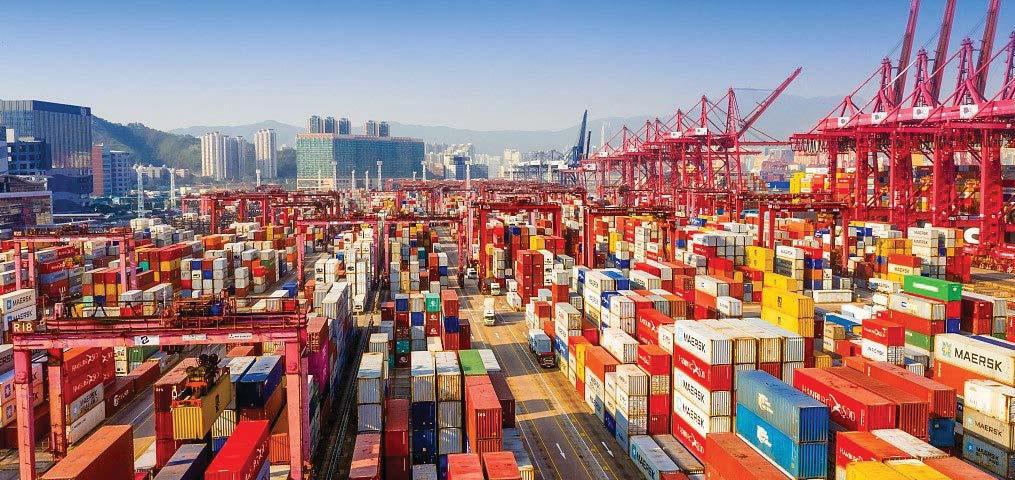
The decline in export proceeds can be attributed to both internal and external factors, leading to apprehensions about the closure of industrial units, particularly in textiles and clothing. Furthermore, imports have also seen a significant drop, falling by 40.25% to $3.82 billion in March and 25.34% to $43.94 billion during the first nine months of the fiscal year.
The trade deficit, however, showed a deceleration of 35.5% between July and March of FY23, amounting to $22.9 billion compared to $35.50 billion during the corresponding period last year. In March, the trade deficit witnessed a substantial decline of 59.75% year-onyear, totaling $1.46 billion.
The downward trend in exports, particularly in textiles and clothing, raises concerns about achieving the export target for the current fiscal year. According to industry leaders, the federal
government's lack of strategy and failure to address crucial issues such as working capital shortages and delayed refunds, including sales tax and technology upgradation funds, have contributed to the export decline. The promised faster refund system has also suffered from significant delays, taking several months to process instead of the initially advertised 72 hours.
High financial and energy costs have further added to the challenges faced by the textile industry. Exporters emphasize the need for dialogue with the government to identify and address priorities, as neglecting the sector will hamper its competitiveness and hinder export recovery.
Exporters also cite hurdles in opening letters of credit and political and economic uncertainties as factors deterring buyers from placing orders. They urge the government to provide clear statements to assure foreign buyers that orders will be delivered on time, as building foreign exchange reserves depends heavily on increasing exports.
Exporters predict a 17% decline in exports for April, pointing to the discontinuation of subsidies on electricity and gas for the export sector as a reason for reduced competitiveness in global markets. Additionally, exchange rate instability has been identified as a significant factor contributing to falling exports.
In summary, Pakistan's export sector faces significant challenges, including declining export figures, delayed refunds, rising costs, and exchange rate instability. Urgent attention and effective measures are needed to address these issues and revive the industry to meet export targets and safeguard employment opportunities.
PHMA requests the Federal Board of Revenue for speedy release of value-added knitwear industry’s sales tax refunds
Pakistan Hosiery Manufacturers & Exporters Association (PHMA) has urgently requested the Federal Board of Revenue (FBR) to expedite the release of sales tax refunds for the value-added knitwear industry. The association emphasizes that the timely release of these refunds is crucial for easing the industry's cash flow and ensuring the payment of workers' wages.
Mr. Naseer Butt, Chairman of PHMA North Zone, has raised alarm over the dire financial situation faced by the export-oriented industry. The delay in the release of sales tax refunds has resulted in significant liquidity losses amounting to billions of rupees. Exporters have expressed their discontent with the prolonged processing times and inconvenience caused by the FBR's halt on releasing the refunds.
PAKISTAN TEXTILE JOURNAL - May 2023 10 News & Views
Despite repeated appeals for assistance, the government's failure to address these issues has exacerbated the challenges faced by the textile industry. The industry has already experienced a sharp decline in exports and foreign exchange earnings, leading to reduced production.
Mr. Butt warns that the government's inaction has pushed the textile industry to the brink of collapse.
Previously, the FBR introduced the FASTER system, which aimed to process refund claims electronically and without delays. The knitwear industry initially welcomed this system, but recent changes, including the involvement of FBR officials in the process, have raised concerns about potential corruption and compromised efficiency.
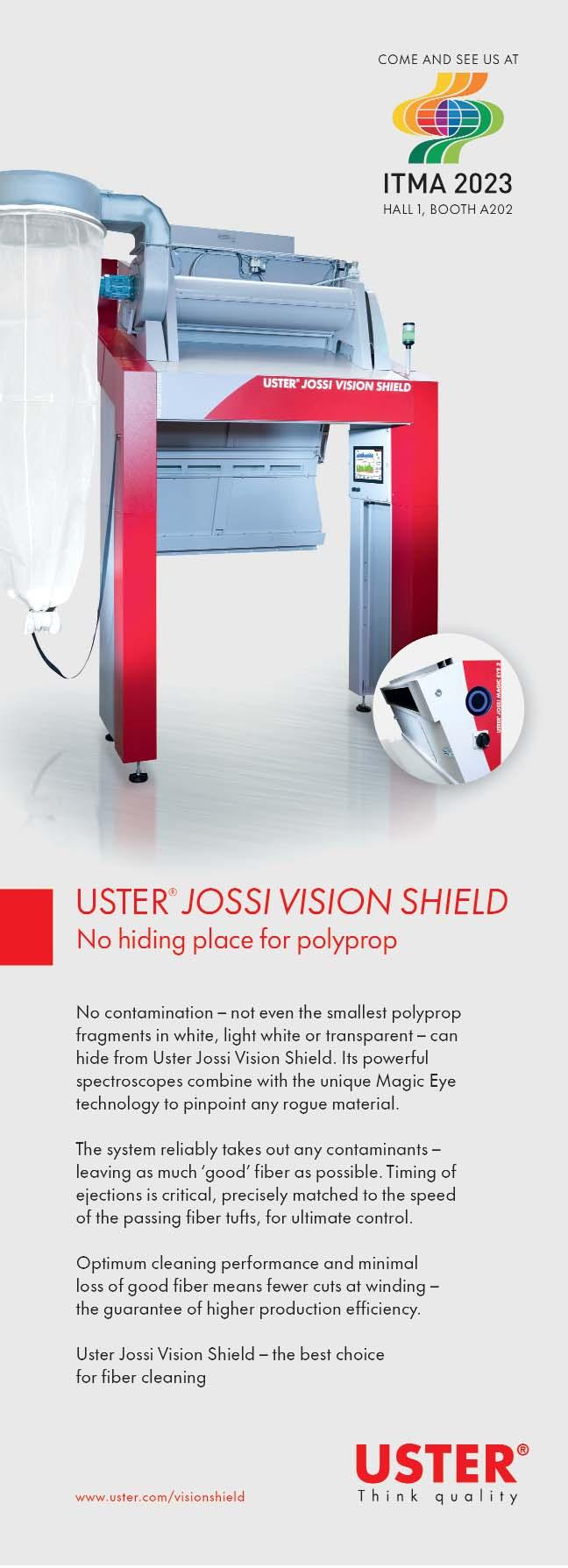
Mr. Butt urges the FBR Chairman to rectify the technical glitches and flaws in the FASTER system, which have caused substantial delays in the processing of sales tax refunds. The current situation has resulted in significant losses and hindered timely exports, rendering the textile export industry financially unsustainable.
The PHMA Chief highlights various flaws and discrepancies in the refund procedure, exacerbating the grievances of textile exporters. Unfortunately, the FBR has not responded adequately to the demands presented by PHMA. Mr. Butt expresses his disappointment with the government's disregard for the export sector, particularly the value-added textile industry.
He laments the lack of attention from the Prime Minister, emphasizing that textile exports have plummeted by approximately 28% in February 2023. Moreover, during the first eight months of the fiscal year 2023, there has been an overall decline of around 11%, primarily attributed to reduced exports of value-added textile products such as ready-made garments and knitwear. Specifically, there has been a decrease of 16% in knitwear exports, 10% in towel exports, and 9% in bed-wear exports.
The situation calls for urgent intervention and support from the government to revive the struggling textile industry and prevent its imminent collapse.
PYMA rejects government’s recent increase of tariffs

"This significant increase in electricity and gas tariffs is an alarming and detrimental move against businesses and industries," expressed Sohail Nisar, Senior Vice Chairman of the Pakistan Yarn Merchants Association (PYMA). He firmly rejected the recent tariff hike and vehemently protested against what he referred to as an anti-business and antiindustry initiative.
Mr. Nisar highlighted the existing challenges faced by importers of raw materials, particularly the difficulties arising from the increasing dollar rate. Importers have encountered
Sohail Nisar, Senior Vice Chairman of PYMA.
significant losses due to the unavailability of dollars, resulting in the containers of imported raw materials being stuck at ports and incurring heavy demurrage and detention charges.
Given the industry's already severe liquidity crunch and the recent factors affecting exports, the government's decision to increase tariffs by more than 400% could prove to be a fatal blow to an industry that is already suffering greatly.
The Senior Vice Chairman expressed concern that in such circumstances, the exorbitant increase in electricity and gas tariffs would make the cost of doing business unbearable. This would have disastrous effects on industries and domestic exports. Mr. Nisar appealed to Prime Minister Shehbaz Sharif and Federal Minister of Energy Power Division Khurram Dastgir Khan to address the economic crisis by reducing the cost of doing business. Failure to take action would make it exceedingly difficult to conduct business and operate industries, ultimately leading to a negative impact on the country's exports and causing unemployment for millions of workers.
Pakistan faces steep decline in cotton production, imports expected to rise
Pakistan's cotton production has declined by 34% this year, reaching the lowest level in four decades, according to data from the Pakistan Cotton Ginners Association (PCGA). The country produced 4,912,069 bales compared to 7,441,833 bales in the previous season. This significant drop poses challenges for the textile industry, which will need to import approximately 10 million bales to meet its annual demand of 15 million bales.
Import financing issues have further hindered the textile mills, resulting in the lowest mill consumption in over 20 years, at 8.8 million bales. To bridge the gap, mills have signed import agreements for 5.5 million bales and purchased 4,605,449 bales locally. Last year, mills had procured 7,332,000 bales from the domestic market. Additionally, ginners currently hold 301,720 bales in their inventory, significantly higher than the previous year's stock of 93,833 bales.
The decline in cotton arrival is attributed to the devastating impact of flash floods and heavy rains during the last monsoon season, particularly affecting agricultural land in Sindh and Balochistan provinces.
Despite strong international demand, Pakistan's cotton exports have decreased by over 69% this year, with only 4,900 bales of white lint exported compared to 11,000 bales in the previous year. The main destinations for Pakistan's raw cotton exports include the Philippines, Italy, Bangladesh, Greece, and France.
Analyzing the data province-wise, Punjab has witnessed a year-on-year decline of over 32% in cotton output, producing 3,033,050 bales this season compared to 3,928,690 bales in the previous season. Sindh reported a substantial year-on-year loss of over 46%, with lint production totaling 1,879,019 bales this year compared to 3,513,143 bales last year.
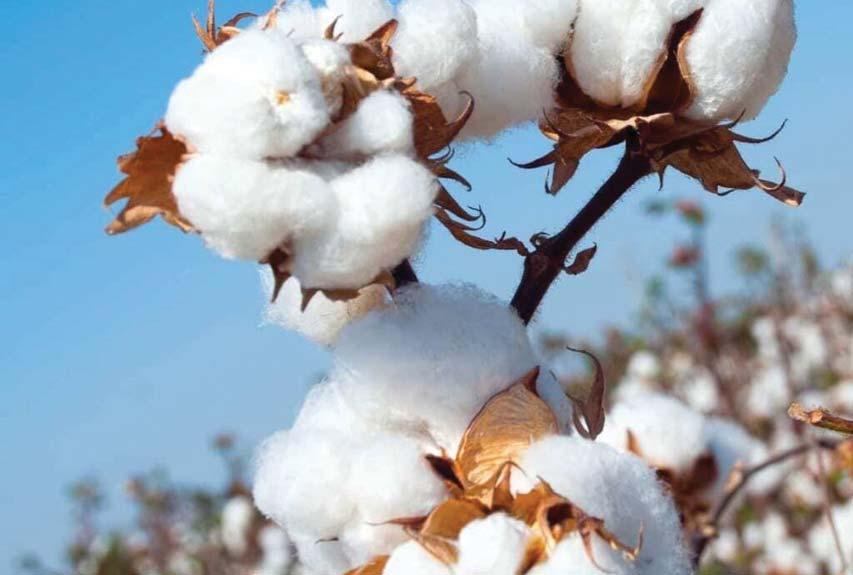
Pakistan's cotton production has experienced a downward trend over the years, with the country's per-acre yield contracting to half of the productivity seen in other regional countries. In an effort to reverse this trend, the Economic Coordination Committee (ECC) expressed concern and approved an intervention price of Rs8,500 per 40kg as proposed by the Ministry of National Food Security and Research.
The intervention aims to attract growers towards cotton cultivation. The ECC also formed a cotton price review committee responsible for assessing
market prices and proposing interventions on a fortnightly basis.
Punjab to take aggressive measures in hopes of boosting cotton production
The Secretary of Agriculture, Punjab, Mr. Iftikhar Ali Sahu, announced that the support price for cotton will be set at Rs 8,500 per 40kg in order to support farmers and encourage increased cotton cultivation. The decision was made during a high-level meeting attended by various agricultural officials and experts.
During the meeting, Dr. Anjum Ali, Director General Agriculture (Ext & AR), led discussions on the reasons behind the significant decline in cotton production in the province. A strategy was devised to address this issue by promoting cotton cultivation and offering incentives to farmers interested in growing cotton.
Mr. Iftikhar Ali Sahu emphasized the need for effective research and development to develop climate-smart cotton varieties that can withstand the challenges posed by climate change and insect infestations. He also highlighted the importance of utilizing print, electronic, and digital media to raise awareness among farmers about modern cotton production techniques.
To further support cotton farmers, the Punjab government is providing a subsidy of Rs 1,200 per bag on certified seeds of approved cotton varieties. Additionally, biocards will be distributed to farmers through the established bio lab in Punjab to assist in controlling harmful insects.
News & Views 12 PAKISTAN TEXTILE JOURNAL - May 2023
Hugo Boss signs Pakistan Accord on safety in textile industry
Hugo Boss has signed the Pakistan Accord, underscoring its commitment to the protection of health and safety of garment workers.
As a binding agreement of company and trade union signatories, the Pakistan Accord is an extension of Bangladesh’s 2021 International Accord for Health and Safety in the Textile and Garment Industry. The International Accord is based on the Bangladesh Accord on Fire and Building Safety, established in 2013, resulting from the dramatic tragedy of the Rana Plaza building collapse.
“At Hugo Boss, we are committed to respecting human rights and safe working standards along our entire value chain and apply this throughout our organisation,” said Yves Müller, CFO and COO of Hugo Boss. ”We take the fair and ethical treatment of our employees, suppliers, and partners worldwide very seriously and look forward to supporting the improvement of labour conditions in Pakistan through implementing the Pakistan Accord.”
In the past, Hugo Boss signed the International Accord together with about 190 other garment brands and unions and now additionally committed to the Pakistan Accord, the company said in a press release.
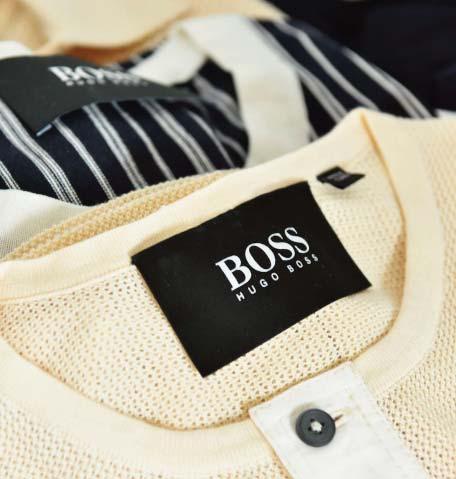
The Pakistan Accord includes all key International Accord features, and promotes workplace and building safety for an initial period of three years through independent inspections,

remediation, an independent complaints mechanism and training programmes for employees.
Together with its fellow signatories, Hugo Boss will provide funds to support the successful implementation of the Pakistan Accord and help uphold and improve occupational health and safety measures in Pakistan’s garment and textile sector.
News & Views
BANGLADESH

Bangladesh’s local Industry suffers due to lack of attention from Government
Bangladesh is the second largest readymade garments exporter in the world but the country’s own fashion industry is suffering due to lack of government support among other factors.
The local fashion industry is not growing also due to the lack of proper planning, absence of research and development, low design quality, lack of government policy support and absence of quality teachers and curriculums in the country’s fashion design schools.
Maheen Khan founder-president of Fashion Design Council of Bangladesh while sharing her concerns said, “Lack of
proper planning, work environment, investment, and policy support are the main hurdle for local fashion producers.”
Many shopping malls and markets in the country are selling clothing items imported from all over the world, with a large number of smuggled products coming through land ports evading taxes.
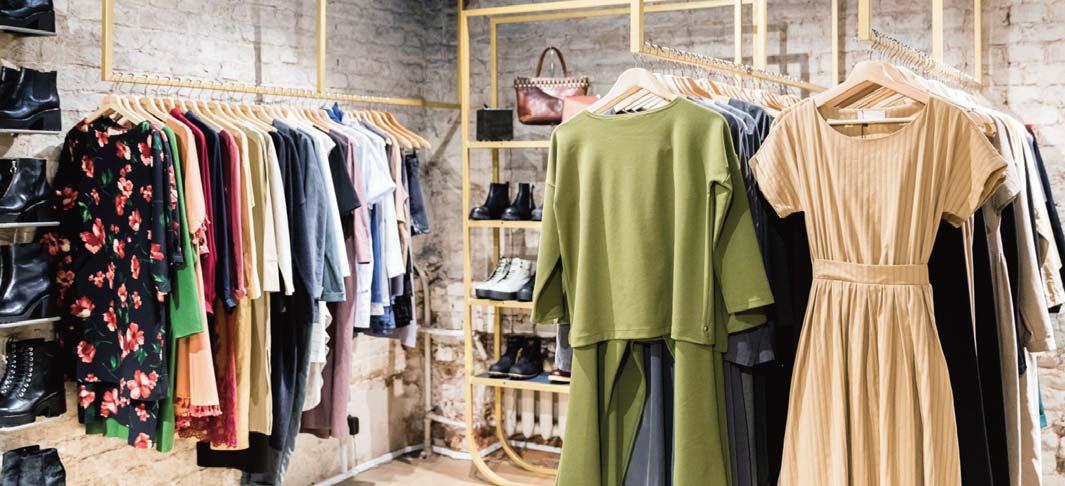
SK Saifur Rahman, General Secretary of National Crafts Council of Bangladesh added to this matter and stated, “Bangladesh produces the world’s finest denim and other clothing items. But local fashion houses import fabrics from China and India. Most players in our local fashion industry hanker after making money. Some claim that they make 100 per cent local items, but it is false and they deceive the buyers.”
‘We are now treated like losers. But once, our saris were exported to Indiawe had such a rich tradition and glory.’
Mohammad Kashem, Banarasi Palli
Shop Owners Association secretary said, ‘We are not in a position to save our rich tradition of banarasi saris due to lack of government patronage, including a place for weavers and necessary assistances. We are not happy to sell Indian products, while once, even in the 90’s, we used to export our saris to India. Weavers and handloom industries are on the decline.’
He disclosed that many weavers had, meanwhile, switched to other professions for survival.
‘The Indian government provides subsidy to weavers in the form of subsidised electricity for power looms, but in Bangladesh they fall in the category of commercial use paying high tariff for electricity,’ he despaired.
There is no alternative to government support for reviving the glory of the country’s high quality banarasi saris, he went on to say.
CHINA
China to digitalize their entire supply chain

China has launched a new digital platform to help identify and trace textile products throughout the supply chain. Possibly to address the concerns of Western buyers on the use of cotton produced allegedly from child labor in China.

Around the World 14 PAKISTAN TEXTILE JOURNAL - May 2023
The online platform will be managed by the China Chemical Fibre Association and National Advanced Functional Fibre Innovation Centre. It will operate under guidance from the Department of Consumer Goods Industry of Ministry of Industry and Information Technology and Suzhou Market Supervision Administration.

Mei Feng, chairman of the National Advanced Functional Fiber Innovation Center said his organization will collaborate with all parties to develop China’s recycled fibre industry. He was confident that the platform will function well and promote the high-quality development of the textile industry.
Adding to this He Yaqiong, director of the Department of Consumer Goods Industry said, “building a certification platform traces the entire life cycle of green fibre products that are conducive to promoting the low-carbon, environmentally friendly and circular development of the industry. He further said that the Ministry would take steps to quickly promote the popularity and recognition of the platform in the industry.”
HONG KONG: HKRITA Signs MoU with INL for a Research on sustainable Future using bio-tech

The Hong Kong Research Institute of Textiles and Apparel Limited (HKRITA) and The International Iberian Nanotechnology Laboratory (INL) signed a Memorandum of Understanding with the intention of exchanging knowledge around wearable technology and fostering developmental research.
The MoU was signed at HKRITA’s Hong Kong seminar, entitled “Smart Manufacturing: A Revolutionary Transformation of the Fashion Industry,” by Paulo Freitas, deputy director-general of INL, and Edwin Keh, chief executive officer of HKRITA.
“Sensor and IoT technologies are already leading to wearable devices that allow monitoring of a variety of biosignals and body related data. INL will work with HKRITA to further exploit new wearable concepts, fabrication, and integration routes aiming at increasing wearable solutions and their wide spread utilization,” Freitas penned at the signing.
The ultimate goal of the partnership is to develop new devices and methods of testing to enhance the performance of wearable tech, which is increasingly becoming an integral part of the lives of many consumers, both socially and occupationally.
HKRITA’s Keh added that “sensor and wearable technologies will make a great impact on our social development, allowing us to explore more possibilities. Our collaboration will generate useful and productive innovations for industry and society.”
The organization has been leading the charge with sustainable textile innovations in Hong Kong, and last year they developed a solution to break up post-consumer cotton-and-polyesterblended fabrics into their constituent fibers which was considered an impossible thing to achieve back then, but HKRITA scientists developed a process that uses only heat, water and less than 5 percent of biodegradable green chemicals to degrade the cotton fibers into cellulose powder and separate them from their polyester counterparts.

INDIA

Textile production halts as demands continues to weaken for Cotton Yarn
The continuous poor demand for cotton yarn in the local weaving industry and the global market is having negative

effects on cotton prices across the country. Export demands are declining every day, and the local weaving market is showing little interest in purchasing new stock. Existing stock is not being utilized as before due to the weak global market demand. As a result, major markets in the country, such as the Delhi market and the Ludhiana cotton market, have witnessed a significant price drop of 70 cents USD per kilogram of cotton. With the ongoing weak demand from the weaving industry, many experts believe that the situation is deteriorating.
Numerous weaving plants within the country have been forced to halt production for 2-3 days every week due to the poor demand, which has put pressure on the entire value chain and led to a payment crisis in the market.
Traders in Delhi expressed their concerns, stating that there is no indication of improvement in demand from the weaving industry. The weak demand has created pressure throughout the value chain and has caused a payment crisis, limiting the purchasing capacity of buyers.
Trade sources believe that the weaker sentiment in Indian cotton prices is a result of the global cotton downturn and reduced demand from spinners. The arrival of cotton was observed at 5,000 bales (170 kg each). In Punjab, cotton is being offered at $74 USD per maund, in Haryana at $72 USD per maund, and in upper Rajasthan at $76 USD per maund. In lower Rajasthan, it is sold for $71 USD per candy (356 kg).
Around the World 16 PAKISTAN TEXTILE JOURNAL - May 2023
UNITED KINGDOM

State-of-the-art sustainable R&D washing facility launched in partnership with the University of the Arts London
The University of London and Denim leader Lane Ateliers have launched what they are claiming to be the country’s first state-of-the-art sustainable Research and development washing facility.
The sustainable R&D Denim Wash Lab was successfully launched on 20th April 2023 after facing a delay since 2020 because of the global pandemic and other related factors.
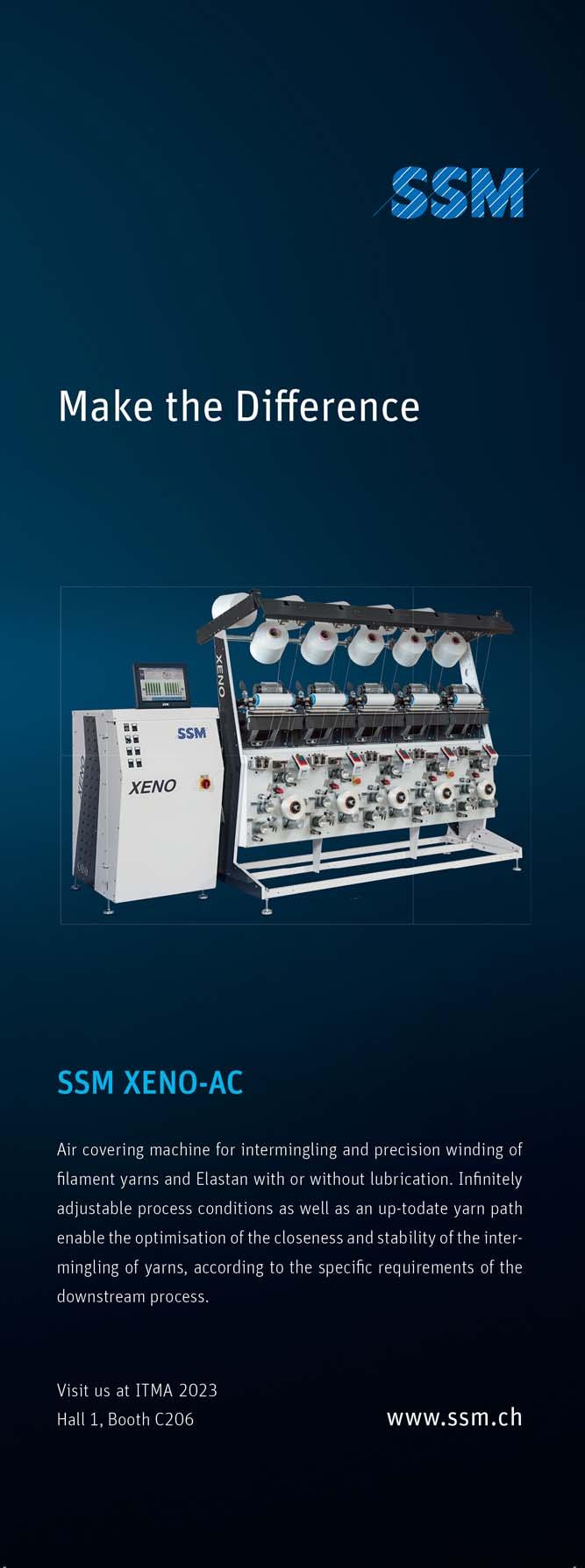
The sustainable lab which is located at Blackhorse Lane Ateliers aims to bring an expertise that has been missing in the country while offering a space to develop unique UK denim aesthetic. The lab will be accessible to students, start-ups, and established brands to explore more sustainable denim wash methods.
The much needed project is backed by local councils including Waltham Forest, Haringey, and Enfield, as well as the London Mayor’s Office.
USA

US records decline in imports of textile and apparel by 19% in the first quarter of 2023
With the global decline of demand for textile US has also seen a decline in the imports of its textile and apparel industry with Apparel imports decline by 19.7%, while non-apparel imports decreased by 20.7% in the first three months of 2023.
According to the latest reports released by the US department of commerce, both segments experienced a decline, in the first quarter (January till March) of 2023, the US textile imports of apparel peaked at 19.472 billion USD, while non-apparel imports made up to 6.400 billion USD.
Apparel imports recorded a dip of 19.73% compared to the 24.259 billion USD traded in JanuaryMarch 2022, while non-apparel imports declined by 20.71% from 6.4 billion USD for the same duration following year.
It should also be taken into the account that among the top apparel suppliers to the US, the import from any country did not improve. The imports from China dipped by 34.89%, following Vietnam by 24.25%, Pakistan 26.9%, Honduras 15.84%, Bangladesh 13.34% and India 11%.
Novafiber starts up textile recycling and airlay lines from ANDRITZ at its mill in Palín, Guatemala
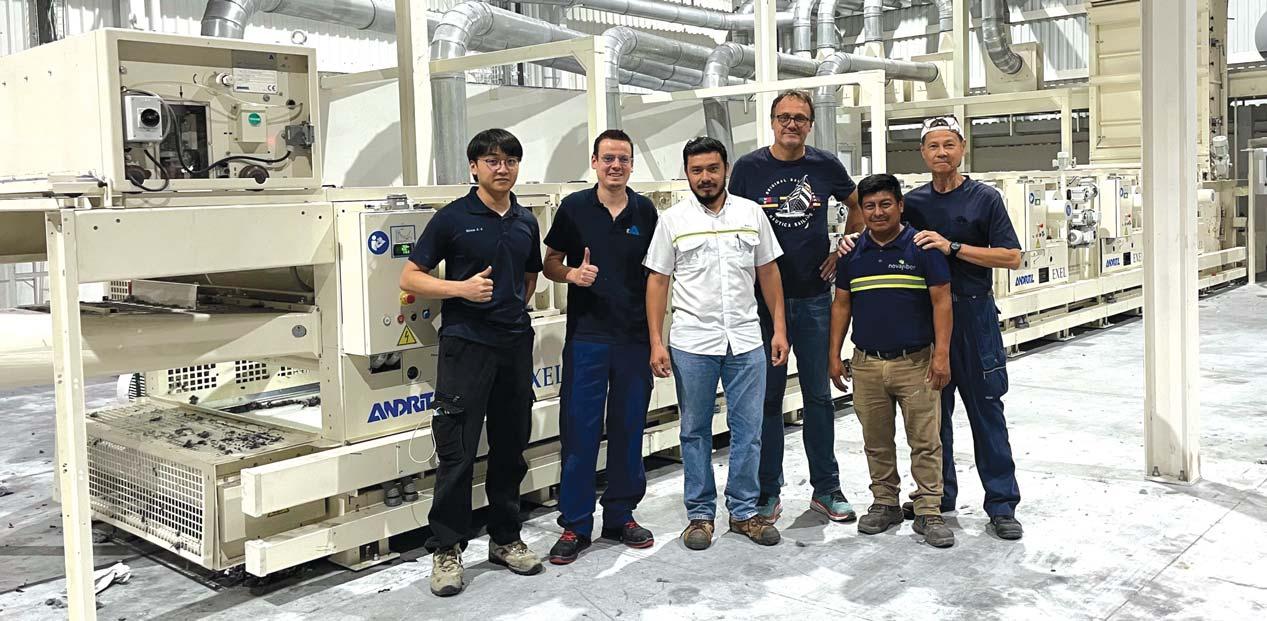
Novafiber, a prominent company in Guatemala specializing in the production of nonwovens from post-industrial textile waste, has successfully established a textile recycling line and an airlay line at its mill in Palín, Guatemala. These cutting-edge technologies, delivered, installed, and commissioned by international technology group ANDRITZ, have been in operation since December 2022, enabling Novafiber to achieve sustainable production at high throughputs.
The recycling line, the second tearing line supplied by ANDRITZ to Novafiber, is dedicated to processing post-industrial textile waste from Central America. By utilizing this line, Novafiber efficiently recycles fibers, which are then fed into the state-of-the-art Flexiloft airlay line provided by ANDRITZ. The airlay line is responsible for manufacturing nonwoven end-products utilized in the bedding and furniture industries. This integration of the tearing and airlay lines exemplifies a circular textile-to-nonwoven approach, ensuring optimal material usage. Notably, any waste generated during the production process is redirected back into the tearing and/or airlay line via an advanced edge trim recycling system.
The combination of ANDRITZ tearing and airlay lines empowers Novafiber to process substantial quantities of postindustrial garments while maintaining control over the entire supply chain, from raw material to final product. Moreover, this implementation allows for energy savings and a reduced carbon footprint by minimizing shipments.
The commissioning process, facilitated through close collaboration between Novafiber and ANDRITZ Laroche, was completed within a remarkably short timeframe. Jean Philippe Bernard, CEO of Novafiber, expresses his satisfaction with the project, stating, "It has been a great pleasure to collaborate with ANDRITZ again on a waste-to-value project. Seven years ago, we launched our first textile recycling and nonwovens production project together with ANDRITZ Laroche. Our new project has also been a perfect opportunity to take advantage of ANDRITZ's technological innovations to achieve an even better fiber opening quality along with higher capacity."
Novafiber, located in Palín, Guatemala, is renowned for its leadership in the production of nonwovens derived from post-industrial textile waste. The company caters to both the domestic market and export demands.
In summary, Novafiber's adoption of ANDRITZ's textile recycling and airlay lines in Palín, Guatemala, has paved the way for sustainable and efficient production processes. This collaboration not only enables the processing of significant textile waste but also demonstrates Novafiber's commitment to the circular economy and reducing environmental impact in the textile industry.

18 PAKISTAN TEXTILE JOURNAL - May 2023 Corporate News
Novafiber CEO and Head of Production together with ANDRITZ technicians and project manager in front of the newly installed 6-cylinder EXEL line.
Inside of a mattress made with Novafiber endproducts from ANDRITZ airlay line.

VDMA: Way 2 ITMA
100 days before ITMA 2023 in Milan, VDMA Textile Machinery launched its “Way2ITMA” webinar series. “Transforming the World of Textiles: efficient – digital – circular”. Under this heading, VDMA technology providers will present their solutions along the value chain.

Speakers of the virtual event were Dr. Janpeter Horn, Chairman of the VDMA Textile Machinery Association and Managing Director of August Herzog Maschinenfabrik, Dirk Vantyghem, Director General, EURATEX, Francis Elias Junker, Area Sales Manager, Andritz Laroche and Tanja Karila, Chief Marketing Officer, Infinited Fiber Company.
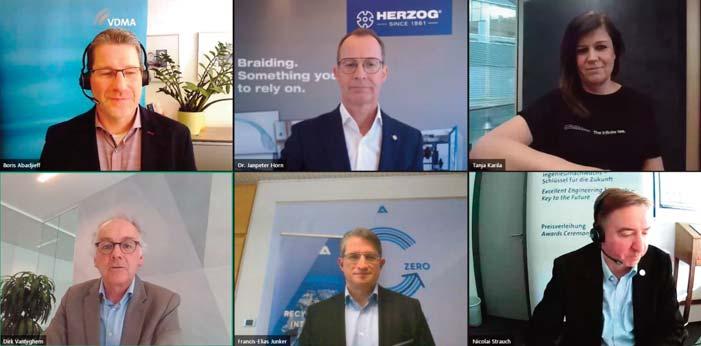
With regard to the EU strategy for sustainable and circular textiles, Dr. Horn said:
“This topic concerns all of us, consumers and producers. We as machinery builders position ourselves as enablers. We want to be part of the solution of this ambitious project”.
Dirk Vantyghem introduced the core issues of the EU textile strategy launched in 2022, which is the most ambitious plan ever, to push the textile sector towards sustainability and transparency, and promote a new circular business model. If wrongly designed, that new framework may collapse the European textile value chain. But if done rightly, the changes ahead could bring a paradigm shift in the sector, where competitiveness is no longer based on price only, but also on
sustainability and innovation, explained Vantyghem.
Francis Elias Junker showed high level of expertise for mechanical textile recycling for both spinning and nonwovens industries that Andritz has. The company has a diversity of solutions to offer and several cooperation partners, covering the value chain from recovery of fiber to the chemical modification and preparation for the production of yarn.
Tanja Karila gave an overview of how Infinited Fiber is turning textile waste into new fibers. Patented technology turns post-consumer textile waste into brand new premium quality fibers for the textile industry. The textile-to-textile recycling technology captures the value in waste that would otherwise be landfilled or burned.
Next topic: Energy management
In the run-up to ITMA, taking place in Milan in June, VDMA will continue the
“Way2ITMA” webtalk series. Topic of the next event will be “Intelligent production and energy management for textile dyeing and finishing processes” with presentations from Sedo Treepoint, Brückner and Thies.
The VDMA represents more than 3,500 German and European mechanical and plant engineering companies. The industry stands for innovation, export orientation and SMEs. The companies employ around 3 million people in the EU-27, more than 1.2 million of them in Germany alone. This makes mechanical and plant engineering the largest employer among the capital goods industries, both in the EU-27 and in Germany. In the European Union, it represents a turnover volume of an estimated 770 billion euros. Around 80 percent of the machinery sold in the EU comes from a manufacturing plant in the domestic market.

20 PAKISTAN TEXTILE JOURNAL - May 2023 Corporate News
New set-up of Mayer & Cie. representation in Bangladesh and Nepal
Sales and service of Mayer & Cie. circular knitting machines in Bangladesh have been under new management. A new dynamic team “Mayer Bangladesh” has been formed. Mayer & Cie.’s long standing Indian representative Batliboi has joined business activities in Bangladesh since the beginning of the month, supported by the team of Brady Services and by Almani Biz. The synergies created by the partnership with Batliboi, Brady Services, and Almani Biz. will allow Mayer & Cie. representations to combine their strengths and expertise to better serve customers.
New & well-known faces in Bangladesh
In Batliboi, Mayer & Cie. has set up a business partner of many decades standing as its representative in Bangladesh. For around 40 years Mumbai-based Batliboi has overseen sales and service of Mayer & Cie. circular knitting machines in India. Abhay Sidham heads Batliboi’s Textile and Machinery Group. He and his team have many years of experience in strategic marketing, and a focus on sustainability and processing recycled raw materials is part of Batliboi’s expertise.
These competences are of relevance in the Bangladesh market because “we
face strong competition from Asian manufacturers here,” Wolfgang Müller, Mayer & Cie.’s sales director, explains. The premium market was growing smaller, and the trend was toward specialities – value-added fabrics, spacer fabrics and athleisure with a high proportion of elastic. Mayer & Cie. sees in these requirements significant potential for its machines – and in Batliboi a partner able in view of its experience to put them to optimal use.
Best possible combination of new and tried and trusted
One building block in the set-up of Mayer & Cie. representatives is unchanged. Brady Services will continue with Batliboi to contribute its close ties with the local market. A significant number of existing companies will continue to be looked after by Brady Services.
The new member in Mayer Bangladesh team is Dhaka-based Almani Biz. A lubricants specialist for circular knitting machines Almani Biz has a wide network with Bangladesh knitting industry.
Mayer & Cie. feels well positioned by this new set-up. Wolfgang Müller says, “

We are of the opinion that the market for machinery in Bangladesh will continue to grow and we are confident that by strengthening our sales, service and marketing team we will be able to make good use of this opportunity.”

A market with great potential
Customers in Bangladesh have placed large orders in the past. The latest, placed in January, was for several dozen machines to be delivered this autumn. Further orders from Apex and BEXIMCO (Bangladesh Export Import Company) are also scheduled for delivery in the second half of 2023.
Nepal represented by Batliboi
While reorganising the set-up of its representatives in Bangladesh Batliboi has also taken over as Mayer & Cie.’s representative in Nepal, where the company had previously had no local representative. There is a demand for machines for interlock, 8-lock and single jersey, but sales are still in single figures. “Nepal has long been served from India, specifically by Batliboi,” Wolfgang Müller says. “So, we have now formalized the existing practice.”
21 Corporate News
Fairs and Exhibitions
Texworld Paris celebrates 25 years!
The anniversary edition of Texworld Evolution Paris will take place this summer from 3 to 5 July 2023 at the Porte de Versailles Exhibition Centre. For the first time, this event will be held downtown Paris. 1,300 exhibitors from some twenty countries have already confirmed their presence.

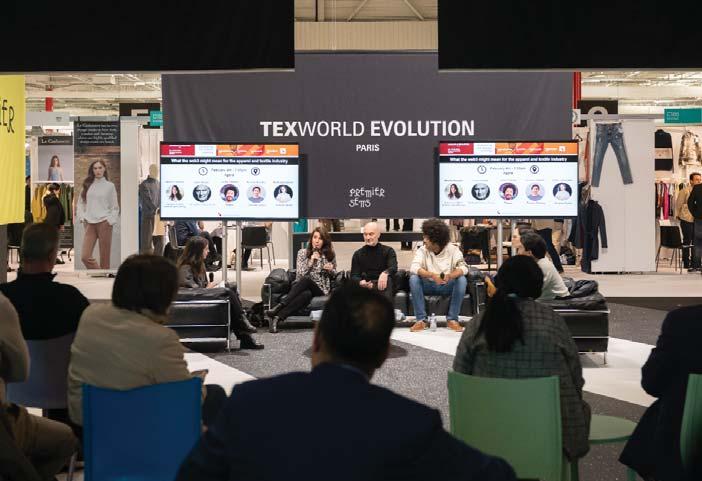
More services, easier access to the heart of Paris, the fashion capital, and finally a return to its pre-crisis level...The July edition of Texworld Evolution Paris will be in many ways a special gettogether for buyers and exhibitors.
1,300 exhibitors expected in Paris for 3 days
This summer the trade fair for the fashion industry will once again bring together all the Texworld Evolution Paris components (Texworld, Texworld Denim, Apparel Sourcing, Avantex and Leatherworld Paris). The exhibition is also set to be the largest event since the end of the Covid-19 health crisis, with more than 1,300 manufacturers expected in Hall 1 of the Porte de Versailles Exhibition Centre, representing a 40% increase in participation compared to last February. Chinese manufacturers are almost back to their pre-crisis level, with the number of exhibitors doubling at Apparel Sourcing Paris and increasing very strongly at Texworld Paris. Manufacturers from India, Turkey, Korea and Taiwan have confirmed their attendance. This anticipation is explained by the very good results of the winter session and the desire of exhibitors to maintain close contact with the market.
25 years: An extraordinary session
The celebration of the 25th anniversary of Texworld Paris will be an opportunity to offer visitors special events, entertainment, but also innovative services and networking. The T-Club area will strengthen its business-oriented services to exhibitors and visitors. This will also be an opportunity for Avantex Paris to reinvent itself and broaden its offer around a Hub dedicated to innovative solutions and companies: performance textiles, solutions for a more sustainable fashion and Web3 players will be present at Porte de Versailles.
Strategic meeting point for the fashion industry
This new configuration, both spatial and temporal, will make it possible to offer visitors two days in common with Curve and Interfilière Paris (organised by WSN Dévelopement) the meeting place for committed professionals from the lingerie, loungewear, swimwear and activewear community, which will be held from 2 to 4 July in Hall 5. The combination will offer an expanded fashion platform and will also lead to shared news and promotion.
Providing maximum convenience for visitors, Apparel Sourcing and Texworld Paris belong to the cluster of related trade fairs organised by Messe Frankfurt France
(alongside Avantex which takes place only once a year during July session), held in one and the same location, on the same dates and where entry is free upon presentation of professional credentials. Texpertise, the textile business network, stands for Messe Frankfurt's entire textile commitment. With a unique portfolio currently comprising around 50 international trade fairs in 11 countries, the company is the world market leader in trade fairs for the textile industry. Texpertise Network covers the entire value chain of the textile industry and, as a central communication platform, provides valuable information on the textile trade fair brands.
22 PAKISTAN TEXTILE JOURNAL - May 2023
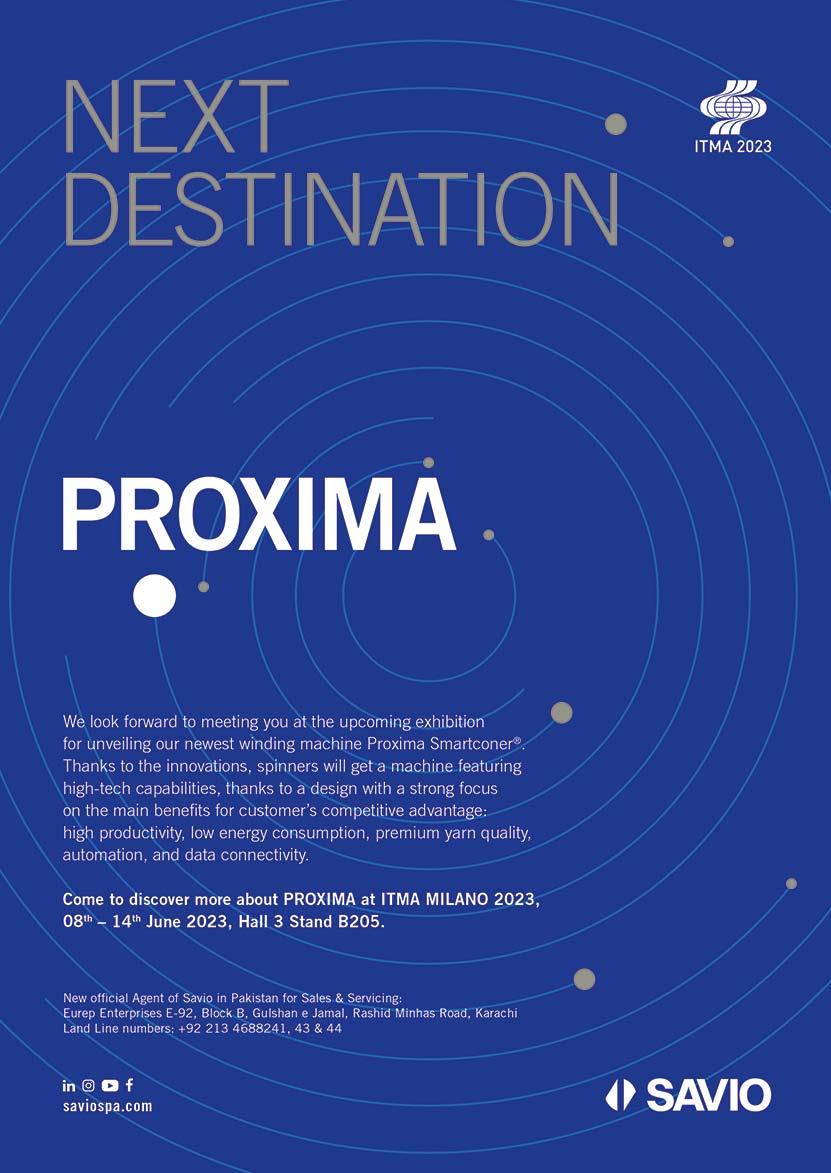
Heimtextil 2024: Demand already exceeds exhibitor number of previous event
For upcoming Heimtextil 2024, over 2,500 exhibitors are already planning to take part in January next yearincluding top players such as A.S Création, Bedding House, Corn. van Dijk, Elastron, Graham & Brown, JBY Creation, Lameirinho, Libeco Lagae, Masureel International, Marburger Tapetenfabrik, Traumina and Wendre. The home and household textile segments Asian Excellence and Asian Selection are also experiencing high demand and are composed of a broad range of high-quality high-volume suppliers from Asia.
Strong registration figures provide tailwind for Heimtextil 2024: more than 2,500 exhibitors have already announced their participation in the world's leading trade fair for home and contract textiles from January 9 to 12, 2024.

"The demand already exceeds the number of exhibitors at the previous event. We are very pleased with the positive response across all product segments – both globally and nationally. In 2024, we will be expanding our range further, especially for the contract business as well as fibers and yarns for home and household textiles," says Olaf Schmidt, Vice President Textiles & Textile Technologies at Messe Frankfurt.
Cross-segment: Strong national and global demand
Heimtextil 2024 is proving very popular with wallpaper suppliers. Here, renowned brands such as A.S. Création (Germany), Graham & Brown (UK), Kinland Decor (Hong Kong), Marburger Tapetenfabrik (Germany) and Masureel International (Belgium) have announced their return.
"At Heimtextil, we start the new year with momentum with our customers from Germany and abroad who are looking for high-quality and innovative wallpapers, 100% made in Germany. We are positioned worldwide. Nevertheless, every year Heimtextil offers new opportunities and possibilities to get in touch with new customers in an uncomplicated way and to meet existing customers again. We regard having the leading trade fair in our own country as an invaluable competitive advantage," says Wolf Kappen, Managing Director Marketing / Sales at Marburger Tapetenfabrik.
In halls 4.1 and 4.2, exhibitors such as Elastron (Portugal), Libeco Lagae (Belgium), Martinelli Ginetto (Italy) and Vanelli Tekstil (Turkey) have announced to show their latest decorative and upholstery fabrics.
24 PAKISTAN TEXTILE JOURNAL - May 2023 Fairs and Exhibitions
In hall level 3.1 (Window & Interior Decoration), curtain exhibitors such as JBY Creation (France) as well as German suppliers such as Albani, Eustergerling and Neutex Home Deco are signaling their interest in participating.
In the Smart Bedding product area in hall 11.0, almost all market leaders are expected to present their latest collections of bedding, mattresses and sleep systems at Heimtextil, the biggest trend platform for textile materials and textile design. Among the announced participants are German suppliers such as Badenia Bettcomfort and Traumina, as well as European manufacturers such as Wendre AS (Finland). A wide range of the latest bedding designs can be expected in hall 12, with suppliers such as Bedding House (Netherlands), Corn. van Dijk (Netherlands), Estamparia Textil Adalberto Pinto (Portugal), Klaus Herding (Germany), Lameirinho (Portugal), Nile Linen Group (Egypt) and Wülfing (Germany) planning to participate here. With the latest range of terry products, Fabrica de Tecidos do Carvalho (Portugal), Mundotextil Industrias Texteis (Portugal), Veritas Tekstil (Turkey) and Welspun (UK), among others, announce their participation.
Contract range in hall 4.0: all exhibitors from the last edition are registered Exhibitors for the contract sector successfully presented themselves in hall 4.0 at the last Heimtextil. Thus, the range of outdoor fabrics, artificial leather and functional textiles for the contract
sector will be further expanded at Heimtextil 2024 and will be more international in scope. In addition, all contract exhibitors from the previous event have already announced their participation at Heimtextil 2024including German leather supplier mah-ATN:
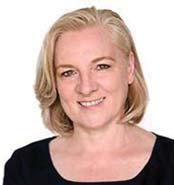

"We are looking forward to presenting many innovative products at Heimtextil 2024. Especially in the field of artificial leather, leather, fabrics as well as cork, we show sustainable and environmentally friendly articles. At Heimtextil, we reach our target group and can present our range directly and personally to a knowledgeable audience. Our presence at the fair allows us to expand our network and strengthen existing customer relationships. We are convinced that this will enable us to further improve our market opportunities," explains Angelika Delalle, Head of Marketing at mah-ATN.
Fully booked: qualitative high-volume suppliers and high-end halls from Asia
The six hall levels "Asian Excellence" and "Asian Selection" are already fully booked - both in the house textile (10.010.3) and home textile (6.0, 5.0, 6.1) areas.
Trade buyers of large volumes will find a unique Asian range of industrial to hand-crafted goods in these hall levels. Here, volume-oriented external and wholesale traders as well as representatives of department stores meet manufacturers who enable orders in medium and high volumes to be placed on schedule. The Asian Excellence range in hall levels 6.1 and 10.2 is composed of high-quality producers with export experience, selected by an independent panel of experts. Among others, D Decor, G. M.Fabrics, G. M Syntex, Grasim Jana Seva Trust from India and Karupannya Rangpur from Bangladesh will be represented in hall 6.1.
“Heimtextil offers us an excellent opportunity to showcase hand-woven and centuries-old techniques from the important weaving mills in Varanasi, Bhuj, Pochampally and Kashmir - in a new guise, with global flair. With the handloom as the backbone of our collection and with a social enterprise model as our main objective, we are creating a new range of rugs, cushions, throws and bed covers for buyers seeking variety and exclusivity,” says Manish Saksena, Lead Advisor at Aadyam Handwoven / Grasim Jana Seva Trust.
In the home textiles section (hall 10.2), selected suppliers such as Al-Karam Textile Mills (Pakistan), Gul Ahmed Textile Mills (Pakistan) and Trident Limited from India will be presenting their high-quality products.
Fairs and Exhibitions 25
Angelika Delalle, Head of Marketing at mah-ATN.
The edie23 event highlights the importance of data and transparency in sustainability
The U.S. Cotton Trust Protocol recently attended and actively participated in edie23, an event held in London by the purposedriven business media brand edie. Formerly known as the Sustainability Leaders Forum, the event, now in its 13th year, focuses on driving tangible environmental and social change through business leadership. Over the course of two days, attendees had the opportunity to listen to experts and sustainability professionals discuss the challenges we face and innovative solutions that can help companies become more responsible and transparent.
This year's theme, "Leadership Through Crisis," centered around the transition to net-zero and sustainability strategy. The event featured multiple tracks and sessions aimed at educating and inspiring participants by providing insights and opportunities to learn from others' experiences.

One noteworthy session explored the importance of transparent communications and the need for companies to be honest with their customers. In an era of greenwashing, consumers are more likely to trust a brand that not only celebrates its successes but also openly acknowledges the work that still needs to be done and the challenges ahead. The Director of
Consumer Protection from the Competition and Markets Authority in the UK emphasized the necessity for increased confidence in tackling greenwashing and greenhushing publicly.
As a program dedicated to contributing to the protection and preservation of the planet through sustainable and responsible techniques, the Trust Protocol was proud to present a case study during the conference. Tara Luckman, Special Advisor to the U.S. Cotton Trust Protocol, delivered a presentation titled "Measuring and improving the environmental footprint of cotton in the U.S." Tara emphasized the significance of environmental data in avoiding greenwashing and stressed the need for metrics and transparency in the fashion industry's supply chain.
During her presentation, Tara highlighted two key issues within the fashion industry. Firstly, the lack of verified data hinders the ability to make informed decisions regarding where efforts and resources should be invested to align with global goals on climate change and sustainable development. Secondly, the lack of transparency in the
supply chain prevents brands from guaranteeing factual information about their products if they do not have knowledge of their origin and route.
Throughout the conference, participants engaged in detailed discussions and sought input from peers and colleagues to address tough questions about sustainability.
The event underscored the importance of industry collaboration as we strive to continually improve our environmental footprint, and the Trust Protocol takes pride in being a part of this collective effort.
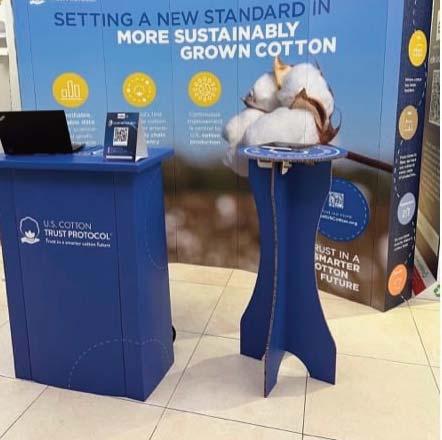
26 PAKISTAN TEXTILE JOURNAL - May 2023

Earth Protex Corp partners with iTextiles®
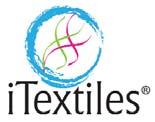
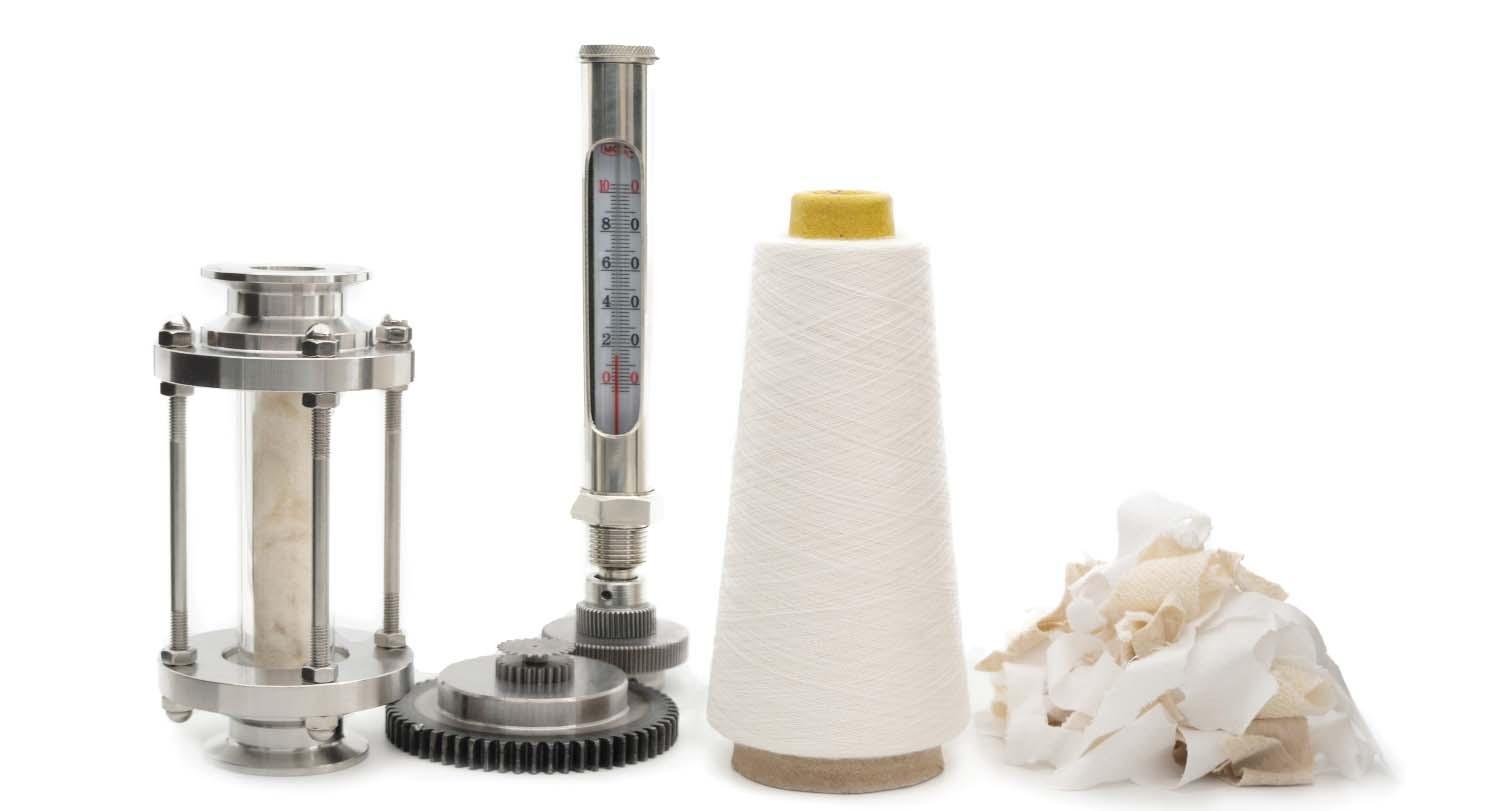
Earth Protex and iTextiles® join in partnership to bring new generation recycled polyester technology to Pakistan.
Earth Protex and iTextiles® announced today that the companies have entered into a strategic partnership that will focus on the distribution of ground breaking textile-to-textile recycled polyester fiber, Tex2Tex™ to major Pakistan manufacturers and brands.
Tex2Tex™ is an important solution as the textile industry needs to move away from single-use plastics such as PET bottles in the circular economy. PET bottles recycled into textile products are generally considered ‘downcycled’. Tex2Tex™ is also a solution in response to
the forthcoming bottle shortage of 10 million metric tons/year by 2025 as the beverage and fashion industry start competing for this limited feedstock.
Tex2Tex™ is a textile-to-textile recycling technology for synthetic textile waste. Through their low impact thermomechanical reactor (TMR) process, Tex2Tex™ converts textile waste into recycled polyester staple fiber and filament. The Tex2Tex™ LCA demonstrates that the process uses less energy and water, and has less carbon emissions compared to virgin polyester,

as well as mechanically and chemically recycled RPET from bottles.
The agreement brings together the innovative technologies of Earth Protex and the strong distribution network and credibility of iTextiles®, and enable the integration of Tex2Tex™ fibers into many top global brands supply chains in the region. The partnership will focus on circular knits, warp knits, denim and socks, however Tex2Tex™ is also suitable for home textiles, suiting, flannels, shirting, and countless other applications.

iTextiles® is a multi-disciplinary textile solutions company that creates and manages, entire value chains in performance textiles. The company has rapidly evolved to become a leading value chain manager in the region, representing some of the biggest international companies and their brands. iTextiles® has aways been known for introducing Innovative textile solutions and is looking forward to work in alliance with Earth Protex to bring more sustainable products to Pakistan.
For Sourcing:
www.itextiles.com.pk
info@itextiles.com.pk +9221-35147784-92.
Features 28 PAKISTAN TEXTILE JOURNAL - May 2023

Irreproachable Quality with XENO-AC
Bishnu Texport Pvt. Ltd. is one of the pioneers in Spandex yarns and manufactures extra fine deniers of air covered yarns. Founded in 2003, the company rapidly grew and expanded its portfolio to include conventional single covered yarns and double covered yarns. Renowned for its high quality, Bishnu is dedicated to customer success and constantly expands its portfolio to serve its customer needs.
The Challenge
Bishnu Texport Pvt. Ltd. is one of the pioneers in Spandex yarns and manufactures extra fine deniers of air covered yarns. Founded in 2003, the company rapidly grew and expanded its portfolio to include conventional single covered yarns and double covered yarns. Renowned for its high quality, Bishnu is dedicated to customer success and constantly expands its portfolio to serve its customer needs.
To better answer customer needs in a timely manner, Bishnu Texport Pvt. Ltd.
decided to produce its own air covered yarns. Switching from a trading company to a manufacturing one does not come without challenges. While it improves delivery time and reduces import costs, achieving the same, or even better, quality is ambitious.
In search for the best air covering machines on the market, Bishnu turned to SSM. While cheaper alternatives were available, the company trusted that the original investment for SSM air covered machines would result in a better return on investment and better fit their motto “No compromise on quality”
The Solution
In 2012, Bishnu acquired 15 spindles of SSM DP3-C machine for its factory located in the northern part of India, near Delhi, where temperature can vary from 3 to 45 degrees Celsius – a real challenge when producing super fine yarns of 10/10 den, polyamide and elastane. With the right airconditioning system and the support of SSM experts, Bishnu successfully set up the
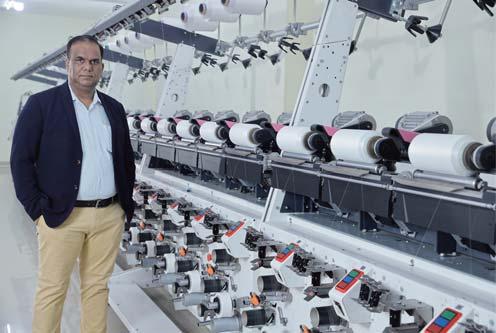
machines and reached a smooth and reliable production.

In 2020, the company owned 90 spindles of SSM air covering machines XENO-AC and its brand has been recognized as high-quality air covered yarns.
The Customer’s Benefits
The main advantage with XENO-AC machines is the quality of the final product. From the yarn quality to the runnability on other machines and the package appearance, everything is optimized. Bishnu and its customers have been enjoying consistent high quality for 10 years and the company’s customer base is growing.
Bishnu is currently exporting its air covered yarns to Japan and Sri Lanka and is expecting long-term business in Japan. Consequently, the company plans to expand its existing capacity of spindles of SSM air covering to 200 spindles by the end of year 2025.
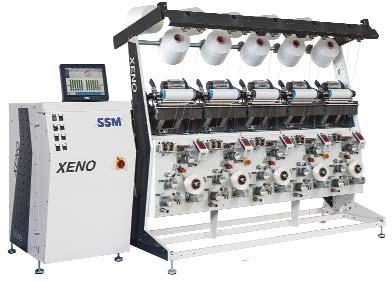
30 PAKISTAN TEXTILE JOURNAL - May 2023
Success story Bishnu Texport Pvt. Ltd.
Mr. Mani Kant, Managing Director of Bishnu Texport Pvt. Ltd.
The air covering machine XENO-AC has no equal when it comes to quality.
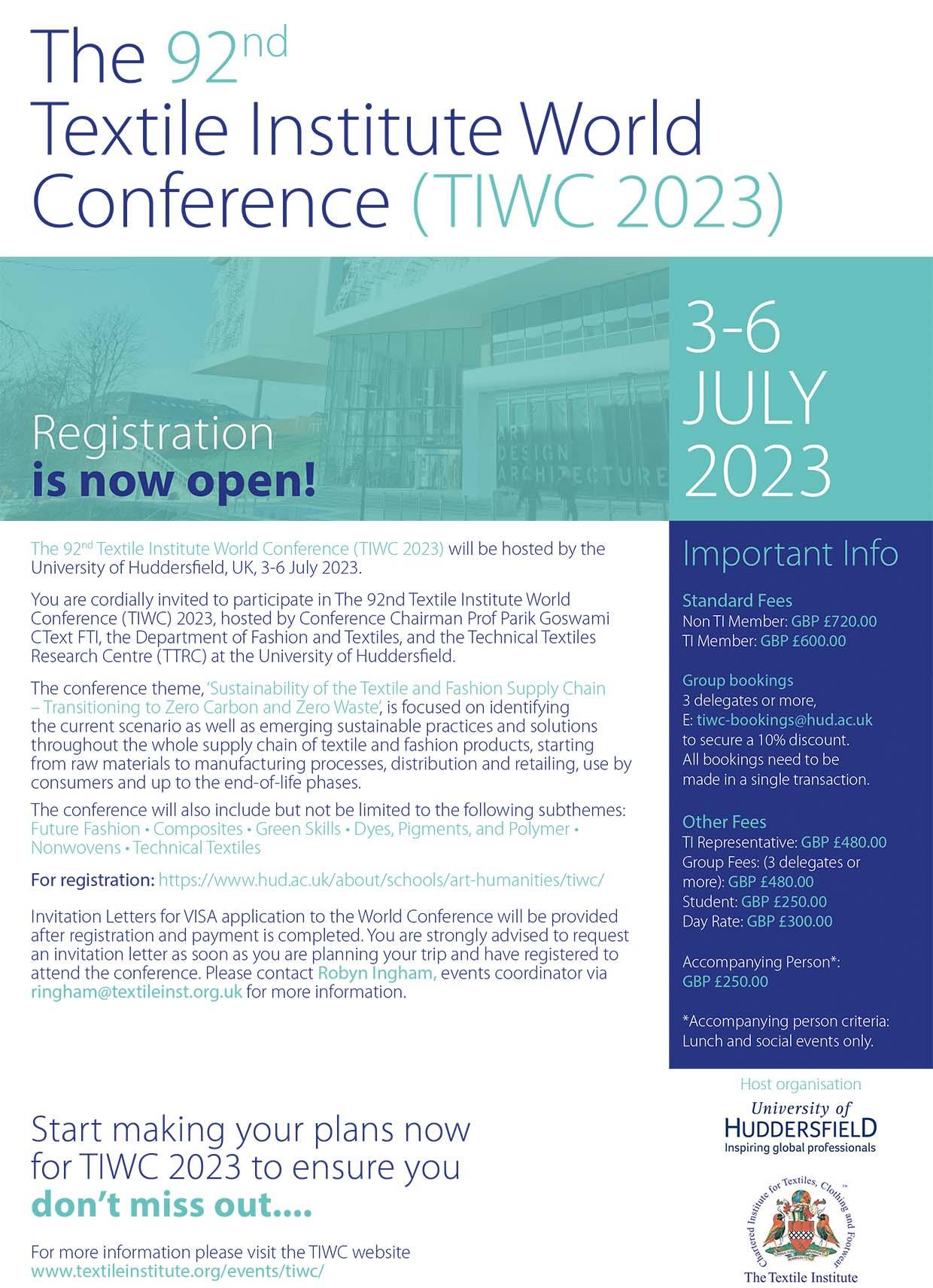
Atlas Copco's tips on how to size pneumatic conveying systems
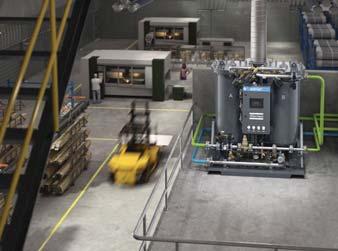
Discover new 5-18kW VSDs air compressors; find out how compressor room could benefit from an inspection plan
Top Tip: Pneumatic conveying systemsRight-sized, every time
Choosing the most suitable systems and components for pneumatic conveying can have a significant impact on operational performance. We can help determine the right solution for the pneumatic conveying process – whatever the application.

Our GA VSDs screw compressor range now comes in 5-18 kW sizes
The most energy-efficient, sustainable, and smart compressor range on the market is getting bigger by going smaller. Atlas Copco’s nextgeneration VSD technology is now available in compressors as small as 5kW, offering smart operation and energy savings of 60% even to smaller air users.

Get a thorough check-up of your compressor room with Inspection Plan
An inspection plan complements your own technical people. A trained Atlas Copco engineer can analyse your
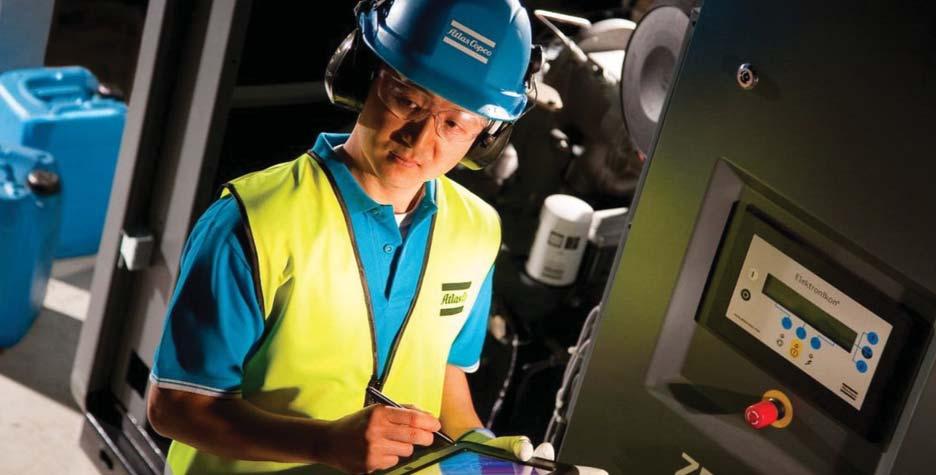
compressed air system and spot problems early. You receive a comprehensive report with recommended actions to keep your equipment running in the most optimal way.
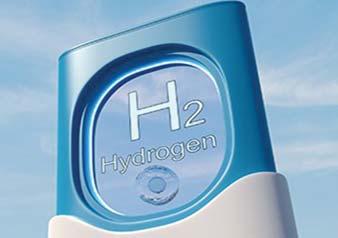
Do you have the right aeration blower for your site?
Air blowers use up to 70% of the energy consumption in a wastewater treatment plant - a good reason to check for any hidden costs and ways to increase efficiency.

We can advise on air blower solutions which offer clean air technology with high energy efficiency and a low total cost of ownership, for both industrial and municipal sites.
Get superior performance and reliability with the NGP+ nitrogen generators
Atlas Copco has announced the addition of the NGP 130+ model to its PSA nitrogen generator line-up. We have also introduced next-generation control and automation technology to all of our smaller (8-130) NGP+ units.
Practical Hints 32
TEXTILE JOURNAL - May 2023
PAKISTAN
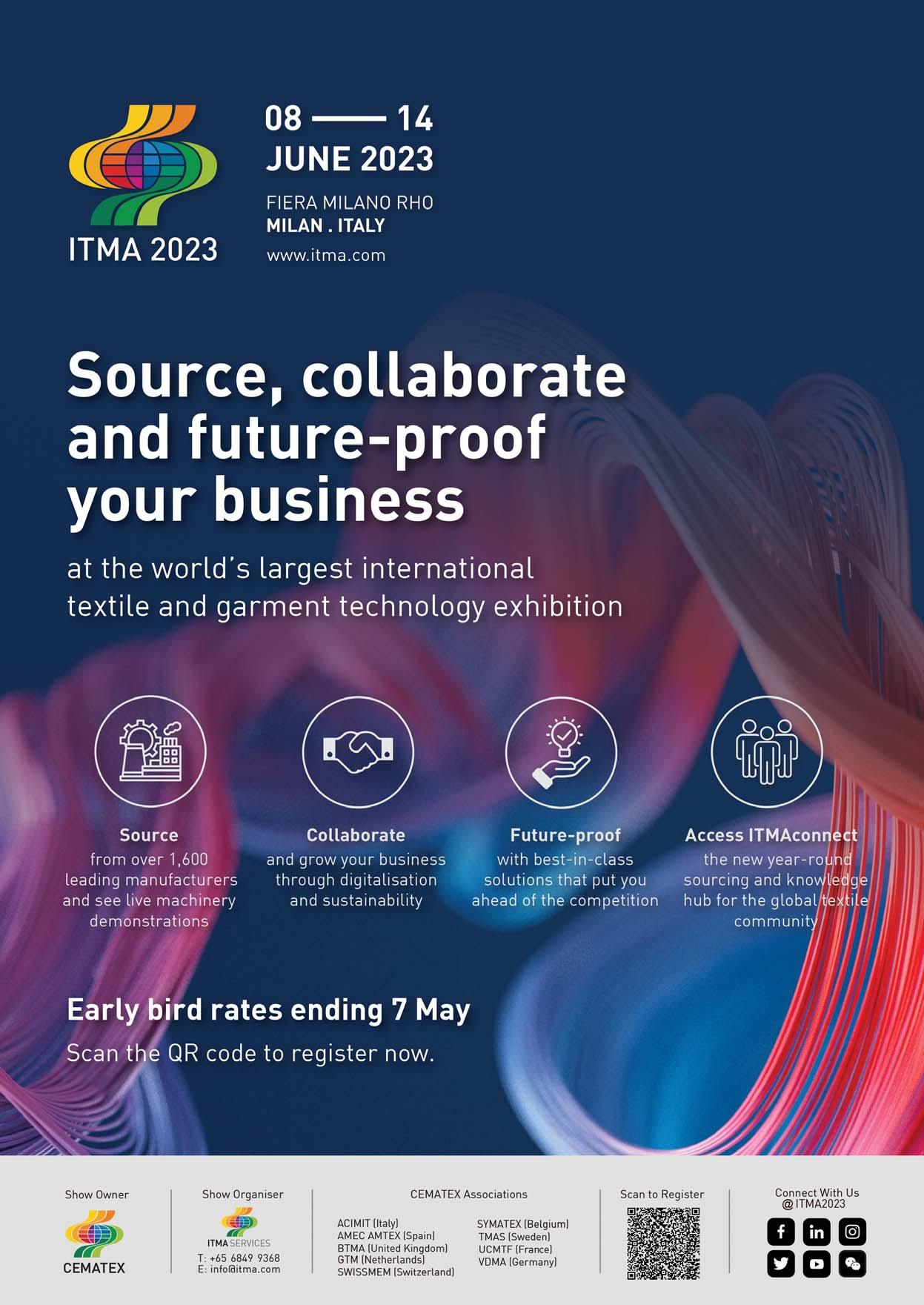
Archroma puts sustainability in the spotlight at Bangladesh Denim Expo 2023
Archroma, a global leader in specialty chemicals towards sustainable solutions, is set to showcase its range of ecoconscious denimwear solutions at the upcoming Bangladesh Denim Expo. Brands and textile mills visiting the international fair in Dhaka from May 16 to 17 will be able to explore the company’s full suite of denim solutions, including an innovative new black coloration system.
Demand for denimwear continues to grow globally, but traditional denim production is at odds with modern consumers’ expectations for sustainability. Brands that aim to compete in this growth market need to be able to produce denimwear that not only delivers sought-after functional capabilities and desirable aesthetics, but that also comes with low environmental impact.

“Sustainability is a top priority for many brands, and consumers are increasingly conscious of the environmental impact of their choices,” said Umberto De Vita, Denim Segment Director, Textile Effects Division, Archroma. “Archroma is challenging the status quo to help denim manufacturers upgrade to more environmentally sustainable solutions while enhancing their competitiveness at the same time. Our innovations make it possible to benefit from efficiency gains and resource
savings in the factory as you deliver products that stand out in the market. Because it’s our nature.”
Sustainable denim solutions
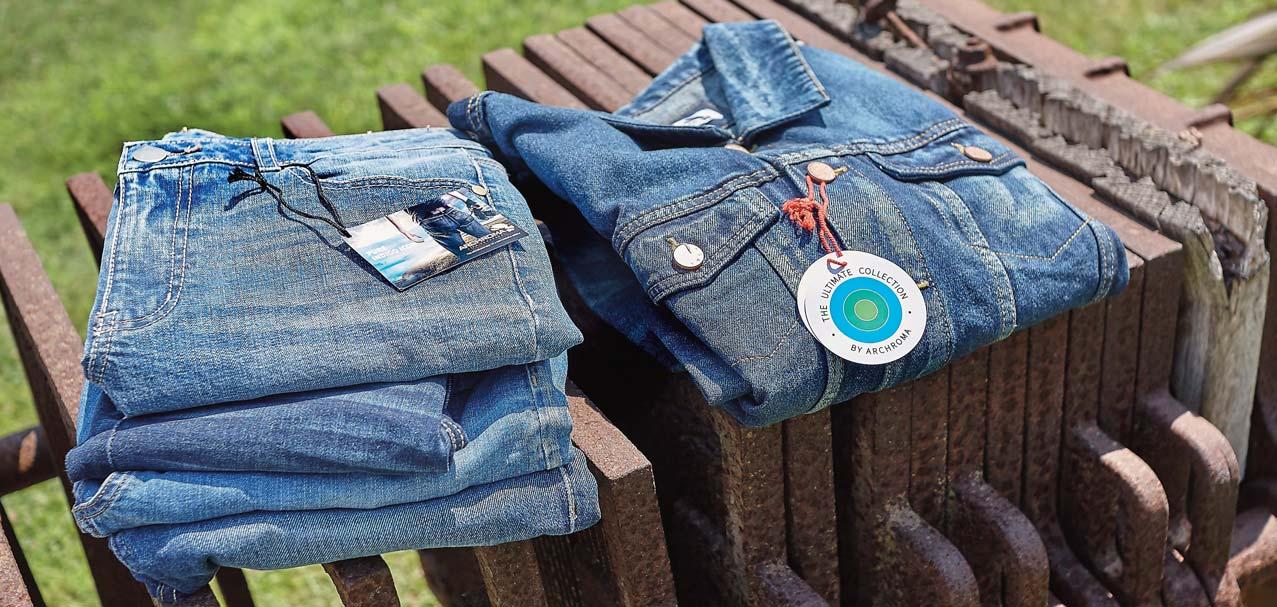
Archroma is showcasing a comprehensive range of sustainable system solutions at the Expo. Among the highlights are DEEP SOUL, a system for overdyeing denim and woven fabrics with low water and energy consumption without compromising the look; PURE INDIGO ICON, an aniline-free* indigo system that produces authentic denim without harming the environment; and INDIGO REFLECTION, a coloration system that behaves like indigo but with a more sustainable and efficient process.
Innovation in black coloration
The company is also introducing its latest addition to the denim systems solution, EVOLUTION BLACK, a groundbreaking black coloration system that
delivers authentic black denim effects with huge resource savings.
The 14th Bangladesh Denim Expo will take place from May 16 to 17, 2023 at the International Convention Center (ICCB) in Dhaka. You are invited to visit the team in person at Hall 4, Booth 57. * Below limits of detection according to industry standard test methods.
34 PAKISTAN TEXTILE JOURNAL - May 2023

Pakistan-Germany Trade: A Fruitful and Growing Partnership

Introduction
Pakistan and Germany have enjoyed a strong and friendly relationship since establishing diplomatic ties in 1951. Their relations are built on shared values of democracy, human rights, cultural diversity, and economic liberalism. Over the years, both countries have fostered close cooperation in various sectors, including trade and development. In this report, we will explore the dynamics of Pakistan-Germany trade, highlighting the historical background, current trade volumes, key sectors, and the role of organizations like GIZ in promoting bilateral development initiatives.
by Nadeem Mazhar, Managing Editor, Pakistan Textile Journal.
Historical background and diplomatic relations
Pakistan-Germany relations have consistently grown since their establishment. In 1959, the two nations signed the world's first bilateral investment treaty, signaling their commitment to fostering economic cooperation. West Germany, now the Federal Republic of Germany, became a member of the consortium providing development assistance to Pakistan in 1961. And later in 1962, the PakistanGerman Forum was established to facilitate dialogue and exchange between the two countries.
Today, Germany maintains a strong diplomatic presence in Pakistan with an embassy in Islamabad and consulates in Karachi, Lahore, Peshawar and Quetta. German investments and business presence in Pakistan
Germany is the eighth-largest investor in Pakistan, with several German multinationals operating in the country. Approximately 35 German companies have a presence in Pakistan, primarily in Karachi and Lahore.

36 PAKISTAN TEXTILE JOURNAL - May 2023 German Review
Table 1: Pak - German Trade
Year Exports Imports Balance of Trade 2017-18 1,365 1,097 +268 2018-19 1,307 1,089 +218 2019-20 1,301 949 +352 2020-21 1,512 1,148 +364 2021-22 1,747 837 +910 Source: State Bank of Pakistan Annual Reports.
Value: US$ Million
Ambassador Alfred Grannas.
The majority of these companies are engaged in industries such as machinery, chemicals, pharmaceuticals, automotive, and related equipment and services. Notably, around 55% of multinational companies in Pakistan are from the pharmaceutical and chemical sectors. The services sector comprises 15% of companies, followed by transportation and textile machinery sectors with 5% each. The German government has committed substantial financial support for development projects in Pakistan, with approximately 3.5 billion euros pledged, a significant portion of which has already been disbursed.
GIZ: German Cooperation with Pakistan
The Deutsche Gesellschaft für Internationale Zusammenarbeit (GIZ) GmbH, working on behalf of the German Federal Ministry of Economic Cooperation and Development (BMZ), plays a vital role in supporting Pakistan's development initiatives. GIZ focuses on priority areas such as sustainable economic development, good governance, crisis prevention and stabilization, and energy. The organization has been actively involved in technical and vocational education and training (TVET) reforms, promoting private sector-led and demand-driven training systems for improved employability prospects. GIZ also supports poverty alleviation efforts by improving access to needs-based social protection services.
Trade volume and sectoral analysis
Germany is Pakistan's largest trading partner within the European Union, accounting for a significant portion of Pakistan's exports to and imports from the EU. In the fiscal year 2019-20, bilateral trade between Pakistan and Germany amounted to US$ 2.25 billion, with Pakistan enjoying a trade surplus. Germany has been a significant market for Pakistani textile products, particularly readymade garments, bedwear, cotton fabrics, and knitwear. The export of textiles and other related products from Pakistan to Germany has been steadily increasing.
On the other hand, Pakistan imports various goods from Germany, including chemical products, textile machinery, electrical goods, motor vehicles, and iron goods. German imports of textile machinery have been crucial for Pakistan's value-added textile sector, enabling manufacturers to improve product quality and reduce business costs. Pakistan's major imports from Germany also include machinery, electrical machinery and equipment, vehicles, mineral fuels, pharmaceutical products, plastics, optical instruments, organic chemicals, iron, and steel.

Prospects and Challenges
The Pakistan-Germany trade relationship holds significant prospects for further growth and cooperation. Both countries can explore new avenues of collaboration and diversify their trade beyond the existing sectors. Germany's expertise in renewable energy, engineering, and high-tech industries can contribute greatly to Pakistan's goal of achieving sustainable development.
German Review
Furthermore, the collaborative projects and technology transfer in these areas can foster knowledge exchange, promote innovation, and drive long-term economic growth for both nations. Moreover, the establishment of joint ventures and partnerships between Pakistani and German companies can create new business opportunities and boost two-way investments. This not only strengthens economic ties but also promotes employment opportunities and skill development in Pakistan. By creating a favorable business environment and offering incentives, both countries can attract more German businesses to invest in Pakistan, further enhancing economic cooperation.
Additionally, the implementation of trade facilitation measures, including the simplification of customs procedures, harmonization of quality standards, and streamlining certification requirements, can remove non-tariff barriers and promote smoother trade flows. Strengthening transportation infrastructure and logistics will also contribute to improved trade facilitation and efficiency. Despite the positive outlook, there are challenges that need to be addressed to fully harness the potential of Pakistan-Germany trade. Non-tariff barriers continue to pose obstacles, including complex customs procedures, stringent quality standards, and certification requirements.
In this context, both countries need to engage in dialogues and negotiations to streamline trade processes and reduce the associated costs for businesses.
Source: Trade Development Authority of Pakistan.
Furthermore, while Germany is a significant investor in Pakistan, there is room for further investment and diversification of sectors. Encouraging more German companies to explore investment opportunities in sectors beyond machinery, chemicals, and pharmaceuticals would contribute to a more balanced trade relationship.
Another challenge lies in promoting awareness of business opportunities and potential collaborations. Efforts should be made to organize trade fairs, exhibitions, and business forums that bring together Pakistani and German companies, facilitating networking and partnership building. This would create a conducive environment for exploring new avenues of trade and investment.
Conclusion
As the partnership continues to evolve, it is essential for Pakistan and Germany to maintain open lines of communication, engage in regular dialogue, and foster a business-friendly environment. By leveraging each other's strengths and working together, Pakistan and Germany can forge a more robust and mutually beneficial trade relationship, bringing about shared prosperity for both nations.
References
1.German Textile Machinery Association (VDMA).
2.Pakistan Bureau of Statistics.
3.State Bank of Pakistan-Annual Reports.
4.Trade Development Authority of Pakistan.
5.Various press releases.
38 PAKISTAN TEXTILE JOURNAL - May 2023
(Major Items) Value : US$ 000 Items 2021-22 2020-21 2019-20 Cotton fabrics 48,185 91,457 75,277 Readymade garments 671,347 567,217 278,997 Knitwear (Hosiery) 671,347 567,217 253,117 Bedwear 349,892 286,867 241,620 Towels 55,097 49,950 36,978 Textile made ups 45,144 38,233 38,641 Tents and canvas 692 487 442 Rice 11,120 14,899 15,917 Leather tanned 2,721 4,477 6,743 Leather garments 58,076 114,043 69,795 Leather gloves 33,094 27,999 21,144 Footwear 9,084 35,217 34,260 Sport goods 7,933 41,105 28,399 Carpets and rugs 4,152 5,486 4,185 Surgical instruments 48,394 64,910 48,572 Fruits 5,826 5,671 7,645 Other items 548,154 92,430 125,850 Total 2,606,258 2,007,665 1,365,000
Table 2: Export of textile and other products from Pakistan to Germany
Quantity: Number Value: Rs. Million Machinery 2020-21 2021-22 Quantity Value Quantity Value Carding machines (Nos) 69 709 75 913 Drawing / Roving machines (Nos) 270 224 47 334 Blow Room machinery (Nos) 7 215 63 516 Textile Spinning machines (Nos) 135 342 50 3,302 Cone / Bobbin Winding machines (Nos) 32 471 8 215 Textile Fibre machines (Nos) 15 152 15 81 Weaving (shuttles machines) (Nos) 28 59 45 176 Flat Knit machines (Nos) 230 120 39 41 Auxiliary machines (Nos) 502 652 39 414 Tops and Flats Card Clothing 22,420 209 59 305 Card Clothing (000 Kg) 29,017 146 40,138 187 Spindles Flyer Ring travelers (000 Kg) 44,971 529 24,214 589 Sinkers Needles (000 Kg) 29,017 146 72,428 260 Drying machines (Nos) 1 492 38,470 1,616 Dyeing machines (Nos) 46 589 2 1.111 Mercerizing machines (Nos) 2 78 351 20 Source: Pakistan Bureau of Statistics.
Table 3: Import of Textile Machinery from Germany (Major Items)

Contribution of German Machinery in the World of Textiles
The economy of Germany is a highly developed social market economy. It has the largest national economy in Europe, the fourth-largest by nominal GDP in the world, and fifth by GDP (PPP). Germany is a founding member of the European Union and the Eurozone. Germany recorded the highest trade surplus in the world, making it the biggest capital exporter globally. Exports account for 41% of national output. The top 10 exports of Germany are vehicles, machinery, chemical goods, electronic products, electrical equipment, pharmaceuticals machinery, transport, basic metals, food products and plastics.
The German mechanical engineering industry plays a prominent role in developing and realizing sustainable solutions, such as effective solutions for new energy concepts and effective handling of scarce resources.
The VDMA, The German Textile Machinery Association, has assumed patronage of the Blue Competence sustainability initiative, which aims to interconnect all of Germany’s mechanical engineering industry. The VDMA accompanies digitalization efforts of its members with numerous strategic and practical initiatives, studies and guidelines.

Today, textile machinery engineering is one of the important branches of engineering and plant construction in Germany. Textile machinery is used by more than 150 countries all over the world.
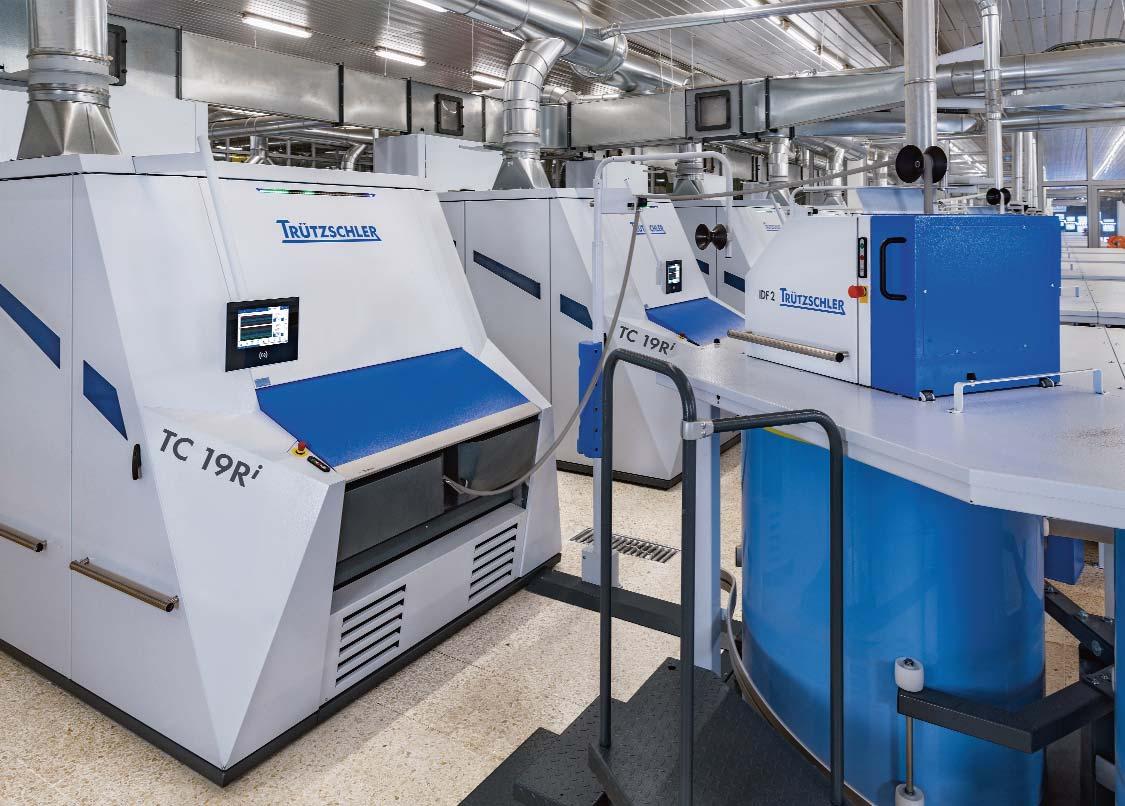
About 120 of the most important manufacturers of textile machinery and accessories from all sectors of the trade are affiliated with the VDMA Textile Machinery Association. The largest parts of the companies are medium-sized firms and stand for approximately 90% of the entire sector volume and produced textile machinery and accessories. In 2022, the branch produced 3.2 billion Euros worth of textile machinery in 2022, showing an increase of 200 million Euros compared to last year’s 3 billion Euros worth of production. The Germans exported textile machinery worth about 2.8 billion Euros worldwide in 2022 recording an increase of 100 million Euros from last year’s numbers of 2.7 billion Euros.
German textile machines are exported all over the world with their major clients being China, India, Turkey, USA, Italy, Brazil, Mexico, Pakistan and Bangladesh.
In 2022, German exports for its machinery showed a tremendous growth in some countries like Uzbekistan and India, however some countries also showed a noticeable decline like China and Brazil.
Exports of German Textile Machinery
The German manufacturers exported machinery worth of 707 million Euros to China in 2022, compared to last year 822 million Euros, recording a decline of 16% in YoY basis.
The exports for the machinery reached 351 million Euros for India in
40 PAKISTAN TEXTILE JOURNAL - May 2023
German Review Country-wise share of German Textile Machinery Exports Value : Euros 000 Country 2022 2021 Change China 707 822 -16% India 351 188 46% Turkiye 344 324 5% USA 266 231 13% Bangladesh 87 35 60% Uzbekistan 84 34 60% Pakistan 81 85 -5% Italy 79 111 -41% Mexico 36 38 -6% Brazil 27 71 62% Source: VDMA
2022, compared to last year 188 million Euros worth of exports, recording a increase of 46% in YoY basis.
The country recorded a substantial growth of in demand of the machineries from Bangladesh and Uzbekistan, The Bangladesh imported 87 million Euros while the Uzbekistan imported 84 million Euros worth of machinery from Germany in 2022 showing an incredible increase of 60% when compared to last year’s import of 35 million Euros and 34 million Euros respectively on YoY basis.
The German manufacturers exported machinery worth of 79 million Euros to Italy in 2022, compared to last year 111 million million Euros, recording a decline of 41% in YoY basis.
To Mexico, Germany exported 36 million Euros worth of machinery in 2022, compared to last year’s export of 38 million Euros, showing a minor decline of 6%.
The Brazil market showed the most devastating decline of 62% for German machinery in 2022 with 27 million Euros worth of exports compared to last year 71 million Euros.
Exports of Textile Machinery to Pakistan
Pakistan has always shown a keen interest in German machineries whether its automobile sector, textile sector or any other sector.
The textile sector of Pakistan has always shared a very good relation with German textile manufacturers. Pakistan textile sector has always shown satisfaction with German textile machinery and its advancement with time to time.
Last year Pakistan textile industry showed a significant interest in German’s textile spinning machinery with exports worth of 34,127,000 Euros just came from the spinning machines sector.
However in 2022, the need of German spinning machinery exports recorded a decline with exports of Euros 26 Million, compared to last year’s 34 million Euros, but spinning machineries still represented a majority share of the total German textile machinery export value to Pakistan.
In 2022, the demand for German machines for washing grew significantly with exports of up to 16 million Euros,
German Textile machinery exports to Pakistan
compared to last year’s export of 12 Million Euros worth of exports, showing an increase of demand by 24%.
Demand for German Card Clothing used in preparation of textile fibres also showed an increase of 22% in demand with exports increasing to 8.3 million Euros in 2022, compared to last year’s export of 6.4 million Euros.
The demand of German drying machines and combing machines also increased in 2022, exports worth of 6.5 million Euros and 3.7 million Euros were made in 2022 compared to 4.9 million Euros and 1.8 million Euros last year, showing an increase of 25% and 22% respectively.
The demand of drawing or roving machines showed a decline with 2.7 million Euros worth of exports in 2022, compared to last year exports of 4 million Euros, a decline of 47% was recorded for this sector.
The demand for replacement parts and accessories accessories remained the same for the 2022, exports of 2.5 million Euros were made, compared to last year exports of 2.4 million Euros, a very minor incline in the demands were recorded.
The German machines for extruding man-made textiles recorded a positive incline of 40%, exports worth of 2.3 million Euros were made in 2022, compared to last year’s 1.4 million Euros worth of exports.
The Pakistani Textile Industry showed interest in Calendering or rolling machines, exports of which showed an increase of 100% to 1.8 million Euros in 2022.
Future Prospects
The general conditions for the textile machinery industry and for mechanical engineering as a whole are characterized by great uncertainty. Internationally, protectionism continues to increase and a final settlement of the U.S.-Chinese trade conflict is not expected to be resolved in the near future.
The economic decline has continued in 2022. A drastic market revival is not yet foreseeable. At the same time, digitalization continues to progress. It is a challenge for existing processes and traditional structures, but at the same time opens up opportunities for new services and business models.
Industry 4.0 sector, and energyefficient technology extending from spinning to finishing – German Textile Machinery Association VDMA is playing a major role in the global textile apparel manufacturing industry.
VDMA’s goal is to increase the competitiveness and innovativeness of its members and to secure the future viability of the textile machinery industry. For this reason, the economic and technical representation of the industry’s interests, networking and exchange of experience as well as professional services are the focus of its work.
41 German Review
Value : Euros 000 2022 2021 Change Machines for washing. 15,915 12,074 24% Drying machines. 6,543 4,907 25% Calendaring or other rolling machines. 6,810 100% Spinning machines. 26,761 34,127 -28% Card Clothing machines. 8,332 6,460 22% Combing machines. 3,726 1,827 51% Spindles, spindle flyers, spinning rings and ring travelers. 2,840 4,071 -43% Drawing or Roving machines. 2,767 4,061 -47% Parts and accessories. 2,544 2,462 3% Machines for extruding man-made textile materials. 2,336 1,401 40% Source: VDMA.
INDIGO TEXTILE: Sustainable factors and innovative solutions are the building blocks of a quality product
INDIGO TEXTILE (Pvt) Ltd. was formed 2005 as a collaboration between two leading textile groups, Haji Khudabux Amir & Umer, one of the most respected cotton trading groups in Pakistan in the textile sector, and Akhtar Textiles, the largest Pakistani suppliers of denim jeans to Levi’s. The joint venture started small, with 42 looms in 2005. At present, INDIGO TEXTILE has 202 looms with plans for expansion to 222 looms in the near future. In 2006, denim production started at INDIGO TEXTILE with the primary goal to work with the leading global brands.
At present, 55 per cent of the denim produced is for Levi’s, and the rest for other leading brands such as H&M, Marks & Spencer, and Inditex among others. INDIGO is represented in the USA, UK and Europe through agencies.
To enlarge their capacities further, INDIGO TEXTILE bought some years ago a POWER-FRAME stenter from the German world market leader for dry finishing BRÜCKNER. According to Aamir Maqbool, Managing Director of INDIGO TEXTILE, the choice of a 12 chamber POWER-FRAME stenter by BRÜCKNER

was made due to several factors including quality, reliability and the lower cost of production provided by the BRÜCKNER machine. The decision, made also in view of future requirements, caters to the increased production requirements and keeps in mind utmost flexibility in finishing.
Today it is clear: the efficiency increased significantly with the new BRÜCKNER machine which is made with German technology and has an excellent reputation of operational reliability and customer service. The high level of

42 PAKISTAN TEXTILE JOURNAL - May 2023 German Review
From the left: Aamir Maqbool, Managing Director of INDIGO TEXTILE, Abrar Mooraj, Nazer & Co., BRÜCKNER Agent in Pakistan.
automation on the BRÜCKNER stenter, allows excellent control on the machine parameters, providing for the best quality finishing results. “A cheaper option might seem attractive on paper but would cost much more in terms of repeated investments, higher running costs and inconsistent quality. Opting for BRÜCKNER ensured a reliable long-term investment” Aamir Maqbool elaborates.

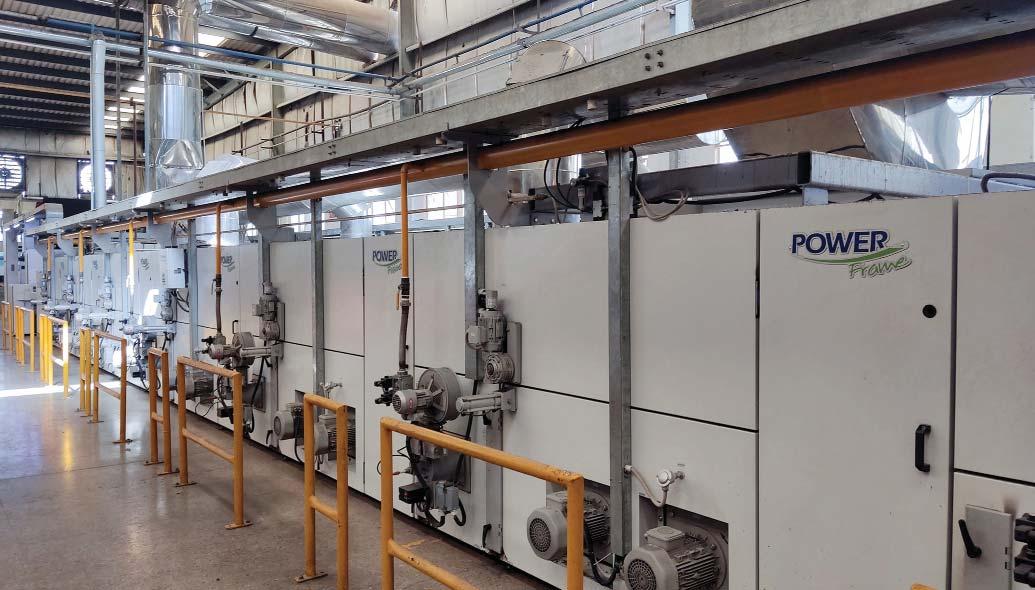
The BRÜCKNER POWER-FRAME stenter with horizontal clip chain and direct gas heating impresses by maximum drying capacity and low energy consumption. The proven split-flow principle provides an optimal air distribution and Venturi nozzles ensure the uniform mixing of ambient and circulating air for a maximum temperature uniformity. At INDIGO, a JBox in the inlet and outlet of the line ensures continuous operation even during batch changes.
INDIGO TEXTILE prides itself on being one of the premium denim producers in Pakistan and having a circular manufacturing system that ensures the finest quality of denim fabric. At INDIGO they control the entire process of denim manufacturing starting from the yarn to the finished fabric. They are backed by all relevant international quality and sustainability standards. The company believes that it is their prime
responsibility to take care of the people and the societies across the globe. For this purpose, they process sustainable denim that is safe for the environment and humanity.
Aamir Maqbool is positive about the future of Pakistan’s textile sector, particularly denim and denim garments. According to him, Pakistan is ahead of its regional competitors in terms of R&D and product development in the denim sector. Over the last few years, while garment capacities have increased, the verticality of Pakistan has also improved.
Supply chain issues are now more relevant than ever. INDIGO TEXTILE has plans to invest in a state-of-the-art spinning mill that will allow them to have complete control over the supply chain with 80% of the demand for yarn being met in-house. As vertical integration in the denim sector grows, so will the ability of Pakistan to innovate, increase product quality to an even higher level, as well as enhance the ability to provide high quality service and on-time delivery. All these factors combine to make Pakistan a global force in the denim supply chain.
43 German Review
INDIGO TEXTILE’s 12 chamber POWERFRAME stenter made by BRÜCKNER.
Latest machines & technologies from the entire Trützschler Group
Spinning, Card Clothing, Nonwovens and Man-Made Fibers
It’s finally that time again: Trützschler is attending the ITMA in Milan from June 8 to June 14, 2023 at Fiera Milano Rho. At our 1320-square-meter stand number C101 in Hall 3, we will introduce the latest machines and technologies from the entire Trützschler Group –including Spinning, Card Clothing, Nonwovens and Man-Made Fibers.
Trützschler Spinning and Trützschler Card Clothing
Trützschler Spinning will showcase innovations for carding, draw frame and combing which meet the most important customer requirements in fiber processing: higher efficiency, more sustainable raw material utilization and intelligent automation – while also displaying the potential of digital technologies for spinning mills. Visitors can also look forward to the introduction of our new brand TRUECYCLED for textile recycling. Our machinery expertise and technological know-how enable our customers to produce sliver with the highest possible level of quality and make it possible to turn waste into value.
Trützschler Card Clothing (TCC) will present a wide range of technologies from its clothing portfolio, which covers
the complete spectrum of applications in the spinning and nonwoven markets. This includes all of the service features and machinery equipment that are supported, which will be demonstrated live at the booth as part of an “Action Point” presentation. TCC is also focusing on recycling applications and will showcase its contribution to sustainability in the textile industry. These features and functions are all supplemented by “My
Wires”, our digital wire performance solution that is integrated into the Trützschler digital platform.
Trützschler Nonwovens and Trützschler Man-Made Fibers
Trützschler Nonwovens will focus on solutions that take nonwoven production processes to a new level. The story of innovations for needle-punching will be told at two booths: Trützschler is going to

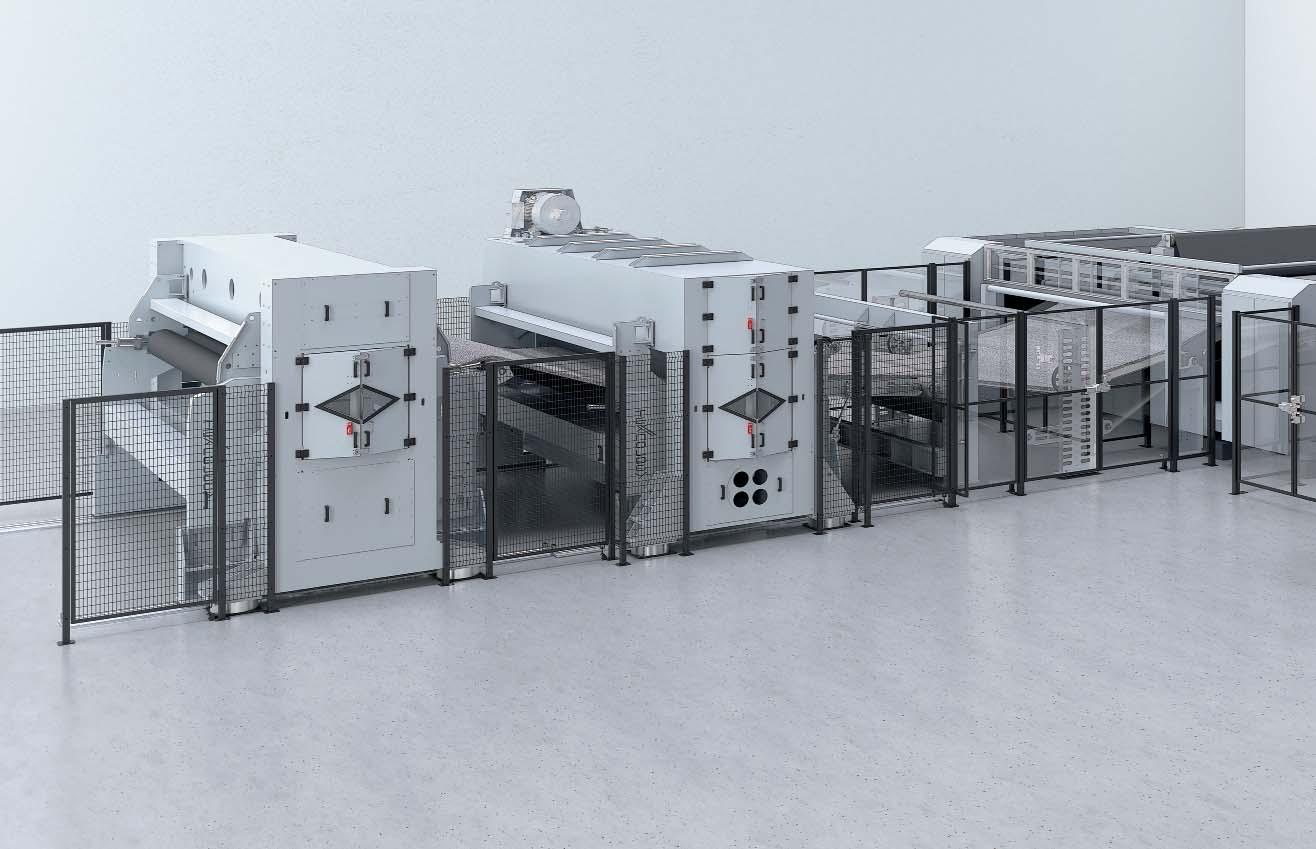
44 PAKISTAN TEXTILE JOURNAL - May 2023 German Review
Trützschler offers proven solutions for textile recycling – such as the intelligent card TC 19Ri for Recycling.
concentrate on the holistic T-SUPREMA package of excellent machinery, tailor made production lines, integrated digital support and global service. Our cooperation partner in needle-punching, the Italian company Texnology S.r.l., will offer details about machinery and applications at booth A101 in Hall 10, and will also provide a chance to check out a running needle-punching line featuring some of the T-SUPREMA machinery.
Trützschler Nonwovens will also showcase solutions for new and environmentally friendly wipe materials, as well as an innovative drying concept. Unlocking the potential of digitalization is the key topic at our T-ONE corner, where our experts will demonstrate every aspect of our digital environment – from quality control and recipe management through to real-time process monitoring and AIbased line optimization.
Last but not least, Trützschler ManMade Fibers will demonstrate the power of OPTIMA, Trützschler Man-Made Fiber’s flexible platform for all types of Bulk Continuous Filament (BCF) carpet and Industrial Yarn (IDY).
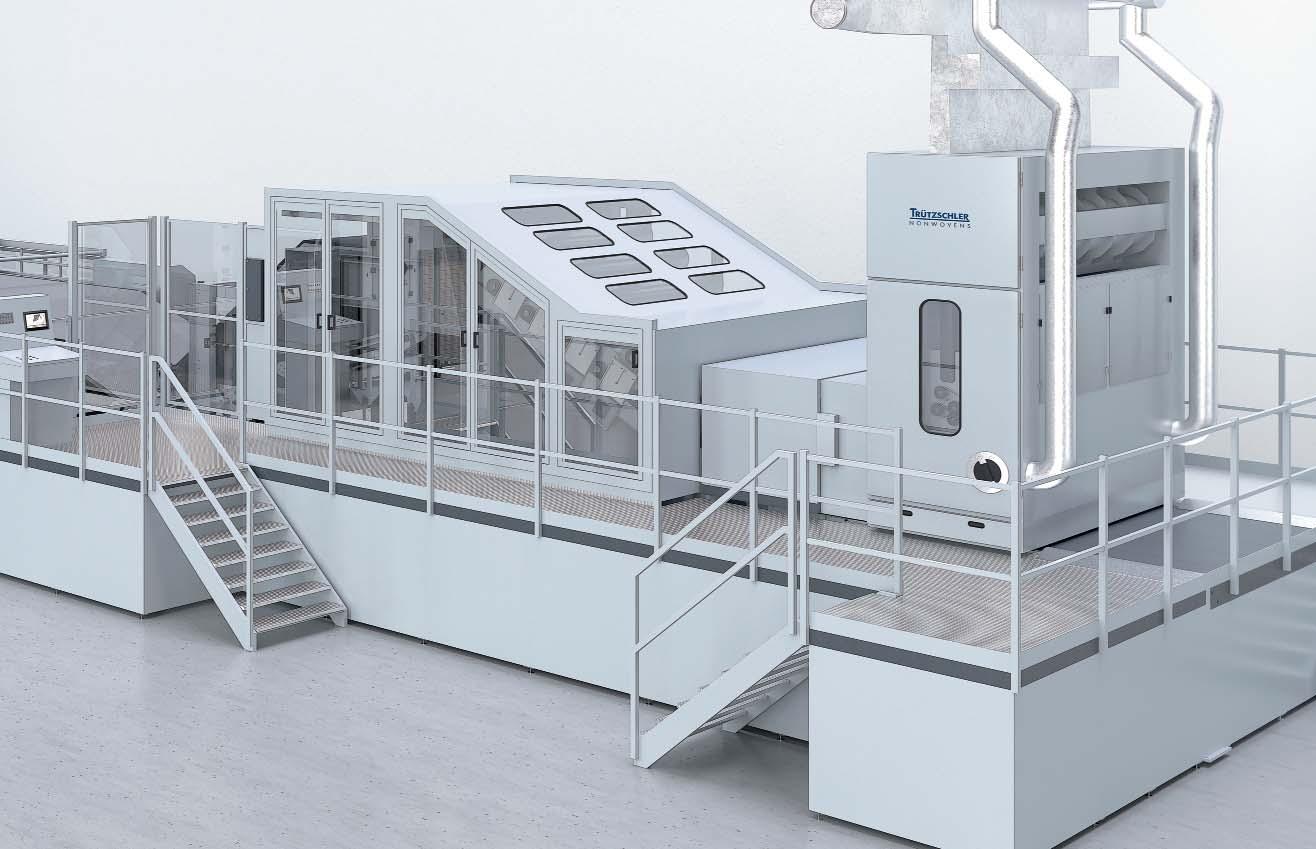
The ITMA offers a great opportunity for people from across the textiles industry around the world to talk to our
experts from every business unit. We are excited to finally meet our new and existing customers in Milan.
Trützschler Group
The Trützschler Group SE is a German textile machinery manufacturer headquartered in Mönchengladbach, Germany. The company is divided into four business units: Spinning, Nonwovens, Man-Made Fibers, and Card Clothing. Trützschler machines, installations and accessories are produced
and developed in ten locations worldwide. This includes four factories in Germany (Mönchengladbach, Dülmen, Egelsbach, Neubulach), as well as sites in China (Shanghai and Jiaxing), India (Ahmedabad), the USA (Charlotte), Brazil (Curitiba) and Switzerland (Winterthur). Service companies in Turkey, Mexico, Uzbekistan and Vietnam and service centers in Pakistan, Bangladesh and Indonesia provide customer proximity in key regions for the textile processing industry.
 A first T-SUPREMA needle-punching line.
A first T-SUPREMA needle-punching line.
45 German Review
A carded-pulp line.
Monforts displays Montex®Coat coating unit at ITMA 2023
Monforts will be displaying its Montex®Coat coating unit at ITMA 2023 in Milan at stand B106 in Hall 18.
Over 30 of these machines have now been sold worldwide, with the majority integrated into some of the thousands of full Monforts Montex stentering lines already in full service.
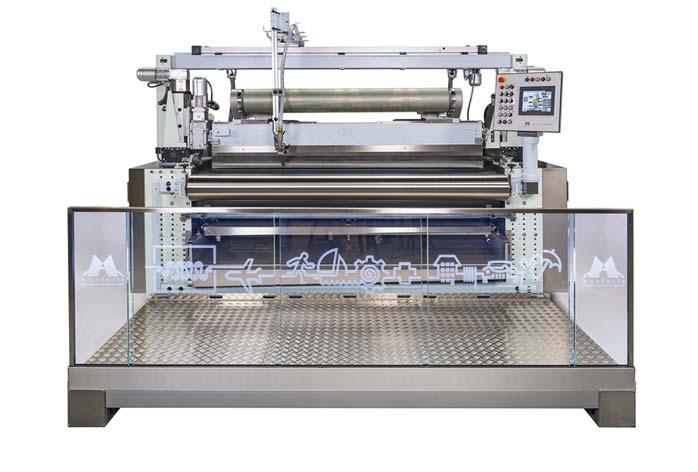
The Montex®Coat serves a diverse number of markets and enables full PVC coatings, pigment dyeing or minimal application surface and low penetration treatments as well as solvent coatings. Knife coating, roller coating or screen printing can also all be carried out with this system. As such, it provides the ultimate in flexibility and the ability to switch quickly from one fabric run to the next, without compromising on the economical use of energy or raw materials.
Robustness
The Montex stenter meanwhile remains unmatched in terms of its robustness and long service life, as well as resource-efficient productivity – overall energy savings of 40% can now be achieved compared to conventional stenters with its heat recovery and energy optimisation options.
“Exhaust air treatment on stenter frames has posed particular challenges over the years, since the air can contain significant amounts of oil, fibre and even wax particles that may see emissions limits being reached in the processing of certain fabrics,” explains Monforts Managing Director Gunnar Meyer. “In addressing this issue, we are incorporating the MonforClean module directly into the stenter frame. With this addition, the waste heat from the drying process is used to pre-heat the drying air,
resulting in a radical reduction in the conventional heat supply required compared to gas and thermal oil heating.”
Nonwovens
Albarrie – a major player in North America’s industrial nonwovens industry –is now benefiting from one of the first Monforts Montex stenter installations equipped with the full range of MonforClean heat recovery and exhaust air purification technologies.
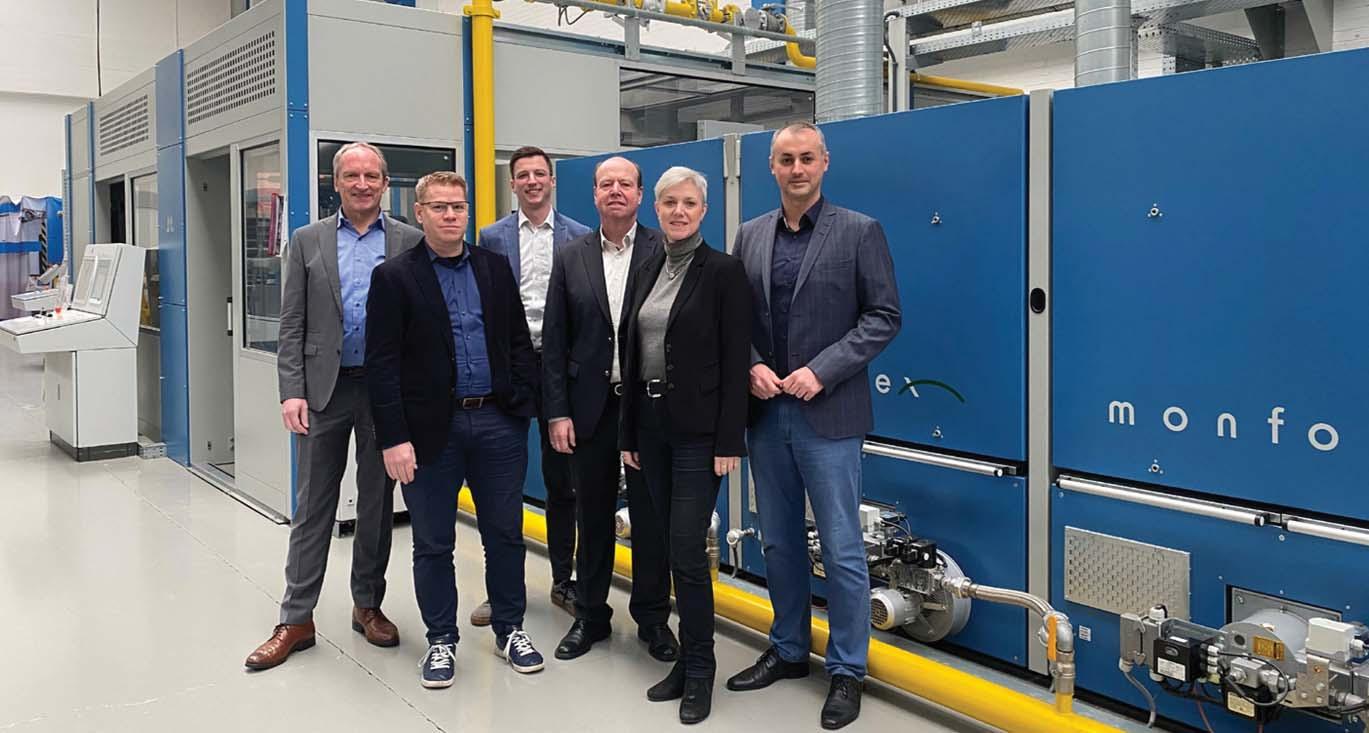
46 PAKISTAN TEXTILE JOURNAL - May 2023
Say hello to the Monforts team at ITMA 2023 (left to right): Sales Manager, Manfred Havenith; Head of Spare Parts, Achim Gesser; Textile Technologies Engineer, Jonas Beisel; Sales Manager, Thomas Päffgen; Marketing Manager, Nicole Croonenbroek and Alexander Fitz, Engineer For Textile Technologies and Co-ordinator of the Monforts Advanced Technology Centre (ATC).
Monforts will be displaying its Montex®Coat coating unit at ITMA 2023.
With the new three-chamber Montex stenter at its plant in Barrie, Ontario, the Canadian company is treating specialised needlepunched nonwovens up to 4mm thick. These have applications in a wide range of filter media and performance fabrics.

“The new Montex is enabling Albarrie to heat set and dry its materials to produce denser, higher quality fabrics which can also be finished and delivered to customers more rapidly,” says Meyer. “We can also offer a series of retrofits for Montex machines in operation, including the Monforts universal Energy Tower– a flexible, free-standing air/air heat exchanger for recovering the heat from the exhaust air flow of thermal processes.”
The Monforts Eco Booster, which completely can be integrated into the chamber design of the Montex stenter, is another retrofitting option. As a single state-of-the-art heat recovery system with automatic cleaning, it can be added to existing ranges. For ranges of up to eight chambers only one module is necessary to achieve significant energy savings.
Intuitive
With the highly intuitive Qualitex 800 visualization software, all article-specific settings can be stored and the formulations for thousands of treatment processes called up again at any time. Individual operators can also personalise their dashboards with the most important machine functions and process parameters.
The Qualitex 800 system is available for the automatic and continuous operation of the company’s Montex stenters, as well as its Thermex continuous dyeing ranges, Monfortex shrinking systems and Montex®Coat coating units.
Be ready for the future
For years Monforts offers several dual heating options for their machines to enable customers to be flexible and independent from one single energy source. For future alternatives Monforts is collaborating with other industry partners on the possibility of using hydrogen as a heating alternative.
With the Q-soft database, a central process control software, production planning and documentation can be easily carried via the central interface where all setpoints and actual values are filed with read and write access for setpoints.

Several machines can be connected at the same time and no additional hardware is necessary. Three levels of network interfacing are possible –Interface to the network, output to a PC with graphic presentation (Monforlogic) and interfacing with a process control system to which can include machines from other manufacturers. As a supplement, the Monforlogic can be used for display, analysis and administration of machine data via a single interface with management of machine parameters amd recipes.
“At ITMA 2023 in Milan, we’ll be happy to explain the range of modifications and modernisations that can be made to your line, as well as all of the benefits of our latest technologies,” says Monforts Marketing Manager Nicole Croonenbroek. “Compared to a new machine, upgrades are a low-cost investment that deliver clearly defined benefits. Do come and meet the team in Milan.”
47 German Review
Network interfacing is carried out via the Q-soft database.
Canada’s Albarrie is now benefiting from one of the first Monforts Montex stenter installations equipped with the full range of MonforClean heat recovery and exhaust air purification technologies.
Weko & RotaSpray to exhibit at ITMA Milan in June
Weko and RotaSpray, the leading manufacturers of rotor spray minimal application systems for textile dyeing, finishing, coating and moisture management will be exhibiting at ITMA in Milan, Italy, from June 8-14, 2023 at Hall 14, Stand B103.

“The worldwide textile industry is suffering from COVID-19 impact and the highly unsustainable use of water, energy and chemicals as well as an immense cost pressure,” said Jayanta Sanyal, head of technical sales and processes at Weko.
Weko and RotaSpray have therefore analysed today’s processing in dyeing and finishing mills to find out opportunities to increase sustainability, productivity and profitability.
Today one of the main dyeing processes is discontinuous and consumes a high amount of water, production time and drainage. The existing solutions for continuous dyeing ranges are consuming high energy, chemicals and generating a high load on the effluent treatment plants. Also in a conventional continuous dyeing range a cost and scrap efficient production of small lots is nearly impossible while the market demands for it, the company said in a press release.
This gap could be closed by using a minimal rotor spray application method
from German companies Weko and RotaSpray. These technologies combine a lot of benefits such as low pick-up, no tailing (contact-free application), stable and precise production, low drainage, strong reduction of energy costs, no centre-side-variation, no hydrolysis, substantivity or incompatibility issues and single and both side dyeing.
The rotor spray technology could be used for reactive, Sulphur, pigment, VAT and disperse dyeing on fabric or denim yarn stage. The key solution beside the special spray technology is the set up of new processes invented by Weko and RotaSpray. For example, the PS2 process instead of the classic PDPS process, or PSB35 instead of CPB and many more.
PS2 process could save up to 1350 tons of CO2-emission every year and could reduce start-up scrap rate by 90 per cent compared to the classic PDPS process. For denim slasher dyeing a new process of a compact slasher dyeing range was recently developed and will be promoted during the coming ITMA 2023. The latest development along with partners is a continuous Polyester Disperse and Pigment dyeing process using another newly invented technology: Weko-Spray +Weko Dry-E + Weko Fix-E.
At ITMA in Italy, from June 8-14, Weko and RotaSpray will be exhibiting at Hall 14, Stand B103.
With the worldwide textile industry facing the impacts of COVID-19 and the increasing concerns around the unsustainable use of resources, Weko and RotaSpray are focusing on improving productivity and profitability in the dyeing and finishing processes in mills.
The Weko Dry-E and Weko Fix-E technology is a combination of advanced near-infrared (aNIR) light energy, high performance management of the NIR energy and a precisely controlled moisture extraction.
The aNIR principle reacts fast with comparatively low energy. The technology is still proven in a lot of other industries and works with electromagnetic waves which have the highest energy densities and effect molecules of various substances much faster than a cotton, viscose or polyester fibre.
Weko Dry-E and Weko Fix-E are based on a pure electrical power supply. Therefore these units can be easily used with renewable energy sources to realise a carbon neutral production. The system could be used on diverse dyeing and finishing lines and unfolds its biggest potential by combining it with a minimal rotor spray application system. Think about the energy saving which could be only reached by immediate start/stop function and format setting. Additionally in a lot of processes like typical stenter frame drying the water molecules are extracted up to six times faster. “This could be a real big step forward in textile processing to reduce the carbon footprint,” concluded Sanyal.
48 PAKISTAN TEXTILE JOURNAL - May 2023 German Review
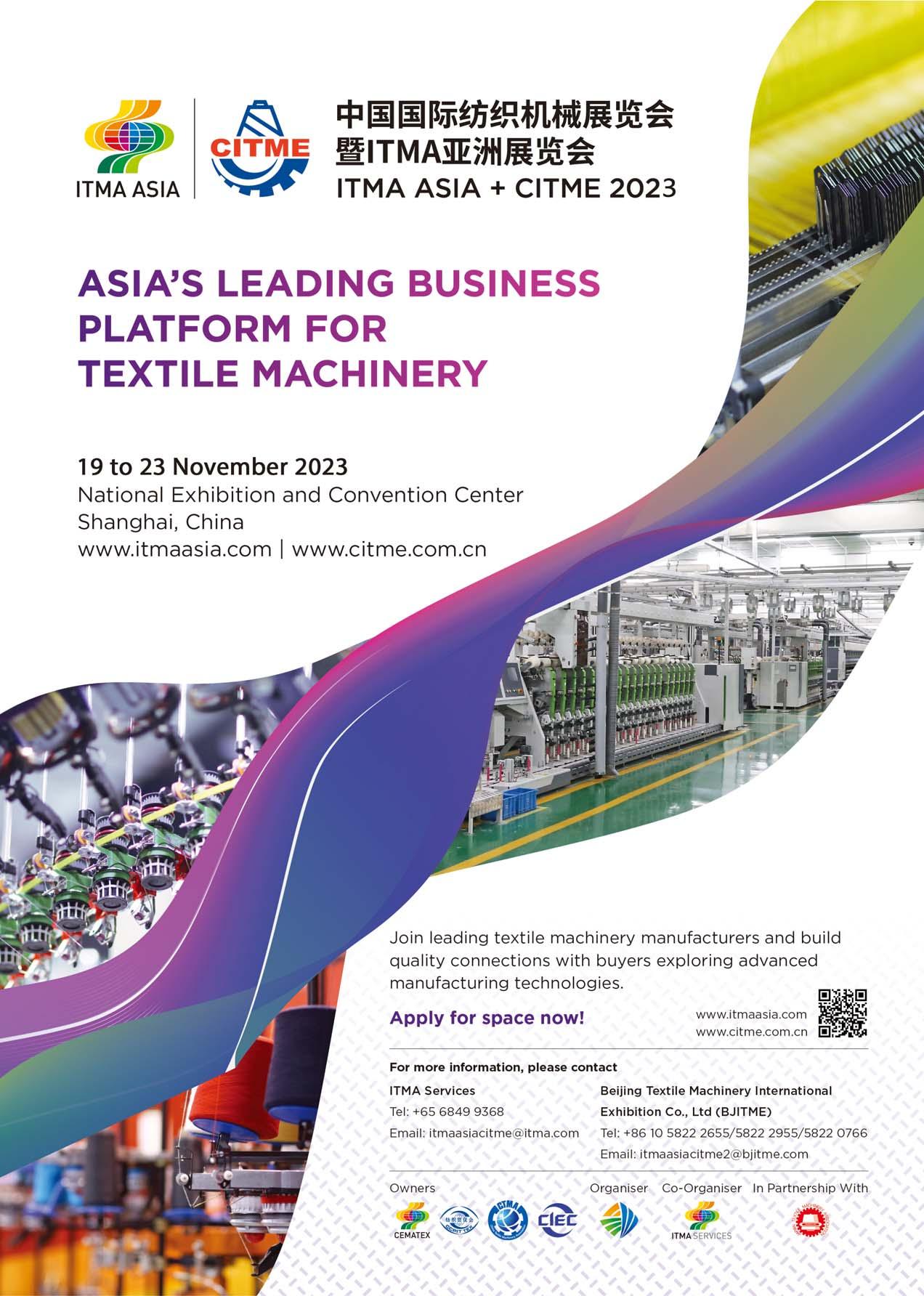
New Accotex Aprons: Field tests confirm high Performance
The latest Accotex apron NO-79201 is made from new compounds that deliver longer life and better performance. Flexible enough to work with all fiber types across ring and compact-spinning machines, field trials show better resistance throughout a 12-month spinning cycle. The NO-79201 is available in a wide range of dimensions as top and bottom aprons for all kinds of applications.
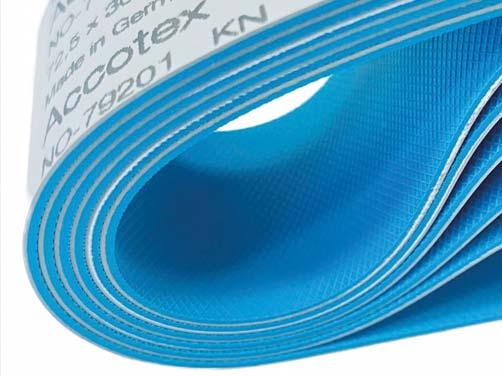
The Accotex NO-79201 (Fig. 1) is a new generation of aprons for ring and compact spinning machines. It is made of two aligned rubber compounds which deliver a high abrasion and crack resistant spinning apron. The mechanical robustness of the rubber compounds allows effective use on all ring and compact-spinning machines, working with all fiber types and within the whole spectrum of yarn counts. The excellent friction properties of the compound contribute to a smooth and even running over the whole service life of the apron, especially at the start-up of machines.
Superior friction behavior
The new Accotex NO-79201 was tested for 12 months at a customer in the USA, alongside the already existing NO78210GX, the NO-78210G and a competitor’s apron (Fig. 2). The friction value of the different aprons was measured over the whole apron life in regular frequencies. Each column reflects the

individual friction value of the inner layer evaluated on representative apron samples from the field test at 3, 6, 9 and 12 months. After 12 months running, the inner layer friction of the new NO-79201 is nearly unchanged, confirming the smooth and even running over the whole service life of the apron. This superior friction behavior has also been reported from other Accotex customers across the world, processing different fiber types, blends and yarn counts. Besides, these trial customers have noticed far fewer broken bottom aprons than they would normally expect.
Different versions for flexible use

The Accotex apron NO-79201 is available in a wide range of dimensions as top and bottom aprons for all kinds of applications. It comes as closed apron, skived bottom apron or skived and pre-glued bottom apron. The NO-79201 can be supplied with a plain inside or a specially configured inner layer pattern, known as a knurled version (Fig 3). The main benefit of the knurled apron is to provide less contact area to the nose bar, which enables lower torque, and thus less stress on the bottom roller bearings. This also allows the inside structured apron to run clean on so-called “dirty” fibers and to work efficiently in demanding environmental conditions in terms of fiber cleanliness. The knurled apron is available with diameters of 72.5, 76.3 and 79.0 mm.
Overall, the new Accotex NO79201 spinning apron provides improved performance for ring and compact-spinning with less machine downtime. Its flexible application may also reduce stocking levels and simplify servicing regimes.
50 German Review PAKISTAN TEXTILE JOURNAL - May 2023
Fig. 2: The new apron NO-79201 shows nearly unchanged inner layer friction, confirming unmatched performance over time.
Fig. 1: Accotex NO-79201 is available in a wide range of dimensions as top and bottom apron for all kinds of applications.
Fig. 3: Accotex NO-79201 can also be supplied with a knurled inner layer, for increased service life.
AUTEFA Solutions: Pioneer in sustainability with innovative solutions
As sustainability becomes an increasingly important consideration in the fashion industry, the demand for textile circularity is growing significantly as consumers and companies alike seek solutions to recycle fast fashion. In response to this trend, AUTEFA Solutions offers innovative solutions designed to process and reuse various types of fibers, including reclaimed, natural and manmade materials. The compact and economical machine for processing all natural fibers such as coir, sisal, jute, hemp and cotton as well as animal hair/wool and textile waste is the Airlay V12/R Aerodynamic Web Forming Machine. Fed by a hopper feeder, the Airlay V12/R is capable of producing nonwovens in a weight range of 4008000 gsm. Re-needling of needle boards in needlepunch nonwovens production must be simple, safe and efficient to
avoid long downtimes and extend the life of the needle boards. AUTEFA Solutions has developed the Needle Exchanger, to meet these challenges. This machine replaces the physically tiring and risky manual process of inserting, exchanging and removing needles with an automated process that eliminates the risk of operator injury and minimizes the risk of needle board damage. With the Automatic Needle Exchanger, AUTEFA Solutions offers a unique service machine. The machine is efficient and equipped with a customized software system, so that reproducibility and safety at each needle exchange are of utmost importance.
The cooperation between AUTEFA Solutions and PAMA Paper Machinery offers the best of two worlds - the nonwoven world based on fiber-based
web forming, consolidation and drying technology combined with the wetlaid technology commonly used in the paper industry. Wetlaid - Spunlace is the technology of choice to produce sustainable and cost-effective nonwovens from 100% cellulosic raw material such as pulp, viscose or lyocell fibers. AUTEFA Solutions Wetlaid/Spunlace technology produces sustainable and biodegradable products for a world with less plastic, designed to produce a uniform pulp layer for optimal fiber distribution with the lowest fiber consumption.
For customers looking for a key supplier for their nonwoven technology needs, AUTEFA's state-of-the-art technology includes carded crosslapped needle punch lines, aerodynamic web forming technology, thermobonding lines, and spunlace lines.

51 German Review
Oerlikon with world premieres at ITMA Milan 2023
“Technology is once again enabling us to create a better world”
Oerlikon Group is set to make significant world premieres at the ITMA Milan 2023 trade show. The company's focus is on addressing the current challenges faced by the textile industry, including the establishment of a circular economy, providing energy-efficient technologies, utilizing digital solutions for sustainable production, exploring new materials, and ensuring traceability and recycling of raw materials. Oerlikon invites trade fair visitors to engage with their experts at booth B211 in hall 1, where they will showcase their innovative technology solutions and provide answers to pressing questions related to the industry's present and future concerns.
Georg Stausberg, CEO of the Polymer Processing Solutions Division and Chief Sustainability Officer of the Oerlikon Group, highlights the company's commitment to innovative technologies that promote resource-saving practices in manmade fiber spinning mills worldwide. Oerlikon's aim is to expand its zero-waste production approach and achieve sustainability goals for both its customers and its own operations.

The challenge of creating a circular economy and promoting recycling in the textile industry is crucial due to the industry's significant environmental impact. The consumption of textiles is already the fourth-largest source of negative environmental and climate change impacts in the European Union (EU), according to the European Environment Agency. The global production of textiles nearly doubled between 2000 and 2015, and the annual consumption of apparel and shoes is projected to rise by 63% by 2030. Oerlikon recognizes the need for innovative recycling technologies and has partnered with Worn Again Technologies, a British company focusing on solvent-based recycling technology. Together, they are developing a large demonstration
system in Switzerland to convert end-of-life textiles and PET plastics into circular raw materials and fibers.
Oerlikon also sets high sustainability goals for its own operations. The company is implementing pilot initiatives with the intention of achieving CO2 neutrality in all its locations by 2030. They have already achieved this milestone at their site in Liechtenstein, which serves as a blueprint for their sustainability commitment. Oerlikon aims to obtain 100% of its electrical energy from renewable sources and adhere to the "Zero Harm to People" standard.
One essential aspect of achieving a circular economy in textiles is fiber-to-fiber recycling. While only around 1% of used clothing was recycled into fibers a few years ago, McKinsey market researchers predict that 18 to 26% of textiles could be recycled by 2030 if technical recycling potential is fully utilized and more textiles are collected. However, there are challenges to overcome, such as automating manual processes, sorting clothing waste, removing buttons and zips, unambiguously identifying fiber compositions, and addressing the obstacle of separating mixed fibers. Nevertheless, there are promising solutions on the horizon, despite some processes not yet being ready for commercial use.
Oerlikon Barmag offers technological solutions for recycling PET (rPET) that can save millions of tons of CO2 per year. They

52 PAKISTAN TEXTILE JOURNAL - May 2023
Georg Stausberg, CEO of Oerlikon Polymer Processing Solutions Division
have introduced a homogenizer recycling line specifically designed for customers in China and Asia, allowing for the agglomeration, extrusion, homogenization, and melting of bottle flakes and film waste to produce polymer melt or chips. This enables precise adjustment of the polymer quality of recycled bottles or film waste to meet the requirements of different downstream processes.
Another rPET solution from Oerlikon Barmag is the VacuFil system, developed in collaboration with BB Engineering. VacuFil is a PET recycling line that combines gentle large-scale filtration with targeted intrinsic viscosity (IV) regulation, ensuring consistently outstanding rPET melt quality. The system includes a patented upgrade component called the Visco+ filter, which enables precise IV setting and pure melt through vacuum assistance. The Visco+ process is reliable, verifiable, and 50% faster than conventional liquid-state polycondensation systems.
In terms of energy efficiency, Oerlikon Neumag will unveil its EvoSteam process at ITMA Milan. This process aims to revolutionize polyester staple fiber production by reducing operating expenses and carbon footprint while minimizing energy, water, and polymer consumption. With the growing demand for textile fibers, resource- and environment-friendly manufacturing methods are crucial for the future, especially considering the rising energy and polymer prices and the scarcity and cost of water resources.

The introduction of new materials poses challenges as well, particularly in meeting the European Union's sustainability goals. While bio-based polymers and biodegradable polymers offer opportunities for a sustainable circular economy, their prices are not yet competitive compared to petrochemical-based polymers. However, Oerlikon believes that with their current and future technologies, they can transform any raw material into an
ecologically attractive end product, with consumer acceptance being the ultimate determining factor.
Digitalization and traceability are essential for achieving a sustainable and closed-loop textile industry. The EU aims to become a pioneer in the global circular economy by 2030, with textile products becoming more durable, recyclable, and compliant with social and environmental standards. Oerlikon will present its own digital technology solutions and collaborations with various partners for use in their technologies to meet these requirements.
The concept of the digital twin plays a significant role in Oerlikon Barmag's vision for the future. They will showcase a complete WINGS POY winding head as a kinematic model, allowing for the mapping of all processes occurring during the operation of a winding head in virtual space. This digital twin enables faster and more cost-effective production solutions for customers.
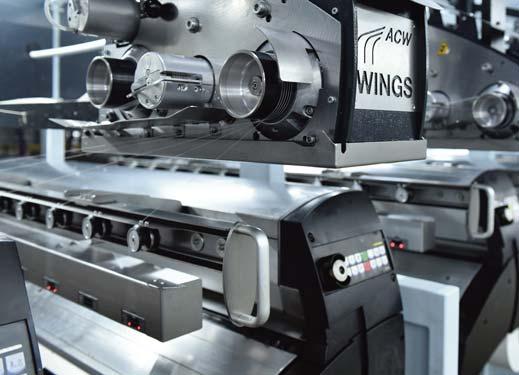
Oerlikon is also launching the Digital Academy, an online training center accessible through the myOerlikon.com ecommerce platform. The academy offers role-based e-learning modules on operation, maintenance, and repairs for Oerlikon

that can be accessed anytime and anywhere.
Additionally, Oerlikon will showcase other innovations at ITMA Milan 2023, including the ACW WINGS upgrade, wiping robots for spin packs, a new air-texturizing line for POY and FDY, gear metering pumps for continuous filament production, and the HycuTEC inline charging technology for high-end charged meltblown filtration media.
Oerlikon's participation at ITMA Milan 2023 demonstrates their commitment to advancing the textile industry through sustainable and innovative technologies, while addressing the challenges of circularity, energy efficiency, digitalization, new materials, and traceability. Their goal is to create a better world by leveraging technology and promoting a more sustainable approach to textile production and consumption.
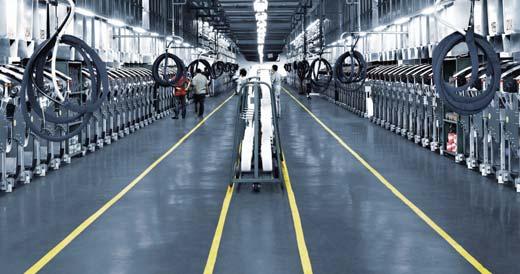
53 German Review
Neumag BCF S+ and S8 machines. This modular and flexible training concept is tailored to the needs and conditions of each student, providing independent learning opportunities
André Wissenberg, Vice President, Head of Marketing, Corporate Communications and Public Affairs Polymer Processing Solutions Division
Erhardt+Leimer presents new inspection technologies for improved production processes

Erhardt+Leimer Group will be presenting its systems and devices for web guiding, web spreading and tenter infeed, as well as slitting devices for edge trimming and slitting of tubular textiles at hall 14 at stand A101.
Some of these products have been tried and tested in the textile industry worldwide for decades. However, E+L has not only made a name for itself in the field of automation technology, but also with inspection technologies; accordingly, the company will be presenting a seam sensor for detecting cross seams, a warp thread sensor and a metal detector that can be used to optimize production processes and make them safer. A newly developed web cleaning system will also be presented.
Sensor acquires cross-seams as reliably as the human eye
The seam sensor marketed as ELSEAMTEX SI 1001 detects, optically and therefore without contact, any type of seam on printed or single-color fabrics. Especially when there are large differences in thickness, such as with carpets and towels, no adjustment work is necessary. Software based on artificial intelligence makes it possible for the first time to detect cross-seams at the level of
human perception. Along with a light transmitter and a matrix camera with lens, the sensor also includes a WLAN card for reliable communication with a smartphone, tablet or any other mobile terminal device. A dedicated app is also available using which, for instance, special seams can be tested or defined offline. If a crossseam is detected, a digital output in the sensor is switched so that, depending on the machine, for example the calender rollers can be opened, the shearing blade raised briefly or the seam left to run through the digital printing press without printing.
Metal detector with segment-bysegment evaluation
During the production of textiles, small metal particles find their way into the web due to the various processing steps. If these particles are not all detected, extremely costly damage may occur on the downstream calender rollers and shearing tools. In addition, there is also a risk of catalytic reactions in wet finishing.
As a result, whole web sections are often converted into scrap. The metal detector ELMETA MDA 1005 / 1006 reliably and accurately detects the smallest metal
particles over the entire width of the web. Per segment (300 mm) a signal LED on the sensor indicates the position of the metal particle in the web. The metal detector can be used for dry and damp web textiles, non-woven fabrics and carpets. Its function is assured at production speeds from 2 to 500 m/min.

Web cleaning for various application areas
ELCLEAN is a modular web cleaning system for the removal of dust and similar soiling in production lines where there is only little space. The system consists of components such as brushes and fabric rollers, as well as components that operate without contact such as powerful fans and a highly efficient vacuum system. The system is equipped with all components or only with certain components depending on the application. Suitable filter systems make possible straightforward, reliable disposal of the soiling. The system is available in both a cantilever version for narrow webs and with support on both sides for wide webs. It can be integrated into production lines or operated as a standalone machine.
54 PAKISTAN TEXTILE JOURNAL - May 2023 German Review
Thanks to special software based on artificial intelligence, the ELSEAMTEX SI 1001 seam sensor detects a wide variety of seams even on printed textiles
The metal detector ELMETA MD 1005 protects textile machines against damage due to pieces of metal, e.g., broken needles, in the web.
Groz-Beckert presents its highlights and innovations at ITMA in Milan


June 8 to 14, 2023, ITMA, the leading international trade fair for textile machinery manufacturing, will be inviting visitors to Milan, Italy, to the Fiera Milano Rho. Around 1,600 exhibitors from more than 40 countries will present their highlights from research and development. Groz-Beckert will be showing its product innovations and further developments in hall 2, booth D101.
Groz-Beckert will be represented at ITMA with its six product sectors and will have various innovations in its luggage. The presentations at the booth will be supported by augmented reality applications. This allows visitors to discover the products both live and virtually.
The Knitting product sector will be represented at the Groz-Beckert stand with its four product groups circular knitting, flat knitting, legwear and warp knitting. In the circular knitting segment, for example, two newly developed knitting systems will be on show which have been realized in collaboration with machine manufacturers. The developments focus on energy savings, extended cleaning intervals and increased process reliability.
The flat knitting group will be presenting a newly developed highperformance needle, which is particularly suitable for the production of technical or medical textiles. For customers in the legwear industry, Groz-Beckert has both further developed sock and fine hosiery
needles and system parts in the bag. Thanks to their high resistance, these products help to reduce knitting process costs. The warp knitting product group will be presenting new needle modules at its booth, as well as the newly developed hole punching needle for piezo jacquard machines.
In addition to the machines for weaving preparation, the Weaving product sector will present its recently expanded portfolio of technical weaving reeds. The new weaving reeds make it possible to supply customers who produce fabrics with high densities. The weaving reeds are used in the production of special fabrics, for example, in technical filtration, membrane technology, solar cells or touch screens.
Products and services for classic needling and hydroentanglement will be presented by the Felting (Nonwovens) product area. In the field of felting needles, visitors can look forward to two world firsts: a new notch shape and the Groz-Beckert felting needle module. In the felting needle module, the needles are embedded as a module in a plastic mold for the first time. The needle modules are characterized by very high deformation
resistance and offer new dimensions in needle density.
For the production of tufted floor coverings such as carpets, bath mats or artificial turf, the Tufting product sector will be presenting its proven Gauge Part system. The coordinated combination of the various materials of the individual parts and the functional interaction ensure a convincing result in the production process.
Various new and further developments will also be shown by the Carding product area. For those interested in the nonwovens industry, for example, the world's finest Interlocking wire for reduced risk of crash is included. For customers of the spinning industry, the division will be presenting further developed stationary flats and revolving tops. The new revolving tops have been adapted to the processing of fine yarns, while the stationary flats have been provided with a new, resistant aluminum profile.
The Sewing product sector is focusing on the presentation of its special application needles, SANTM. The sewing machine needles of the SANTM series have been specially developed for demanding sewing operations – e.g. for sewing technical or finest textiles. The division will also be presenting its new Needle Finder. The Needle Finder is an interactive tool in the online customer portal that helps customers select the right needle.
55 German Review
PLEVA showcases technology for energy-efficiency processes
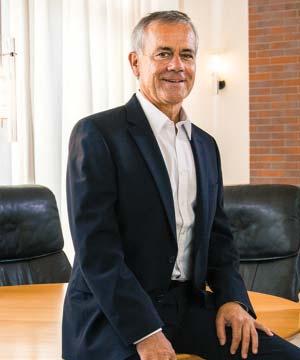
Dr. Ralf Pleva, Managing Director says “We enable textile producers to save large amounts of energy, improve product quality and make even complex processes more traceable and reproducible by using high-end sensors and controls with latest technology. In other words, we are unlocking the gateway to tomorrow's production. PLEVA will showcase all highlights live in hall 11 booth A101. ”
PLEVATEC pro
The new, advanced process control system PLEVATEC pro allows an integration of a huge variety of process critical data with all information at one glance and optimal controls. It is designed to enhance and simplify operation even at complex production lines with different modules.
Hereby, tolerances can be set as well as parameters saved and loaded within the integrated recipe management system. The customizable system provides solutions to a huge range of processes, e.g. a production line with foulard, coating and stenter frame.
In general, an integration of the following PLEVA devices is possible:
Exhaust humidity FSX for great energy savings.
Fabric/air temperature TDS for transparent drying/heat-treatment processes.
Residual moisture RR, RF/AF for improved fabric quality and efficiency.
Application moisture/coating AF/MP for savings of valuable chemicals. Pick/course density CAM for high quality fabric.
Through the continuous process monitoring and control of the parameters, a significant optimization of even very complex production processes is possible. And by having more stable processes, a constant, high quality of the goods is ensured. This means that there are no expensive adjustments or secondchoice goods, which saves valuable resources.
The smart way of weft-straightening SL smart: The SL smart is designed for knitted and woven fabrics with a plurality of solutions customizable to fit the individual customer needs. It includes options like fully-integrated accessories for tension-sensitive fabrics, Industry 4.0 applications and more. The heart of the SL smart is the well-established traversing camera technology which is unique in weft-straightening.
The high-resolution camera captures more than 20 measuring points per meter of fabric width. This gives a complete overview of the fabric instead of few fixed positions. Finally, advanced evaluation algorithms ensure an ultraprecise distortion analysis which enable perfect straightening results in a blink of time. With the weft-straightener SL smart only one round through the production line with the respective fabric is needed and the aimed result is directly produced. This, of course, also saves energy and enhances the production efficiency directly from the beginning.
The all seeing eye – CAM series 400: For the assessment of quality parameters but also weft-straightening, precise detection and advanced image processing is the most important aspect. The brand new CAM offers cutting-edge technology with many novelties for best results: Completely new lighting with increased
brightness and special lighting possibilities allow a detection of all kinds of fabric independent from density or color.
This in combination with a four times higher calculation power, higher resolution with five-times more pixels and revised algorithms for calculation of distortion and pick/course density makes it the leading technology in the area. On top, it is also designed as a retrofit for existing PLEVA systems with easy connectors and is fitted for even the harshest conditions thanks to an improved housing design.
Sizing made sustainable and efficient with updated AS 120: Sizing is the crucial preparation for weaving and high yarn quality. Therefore, sizing agents are applied with a squeezing unit to the warps. To be on the safe side often 1025% more sizing is applied than required. This implies disadvantages like higher use of expensive sizing agents, more wastewater, unstable yarn quality, lower weaving efficiency, etc. To eliminate those disadvantages, a measurement and control is needed.
The AS 120 measures the size add-on after size box constantly. It includes a newly designed special construction with integrated protection against steam vapours and high temperatures as well as a faster, even more precise electronic. This enables a reliable, continuous monitoring and control. As a result, 1.5% up to 4% higher weaving efficiency is easily possible and at the same time production gets greener.
Besides those new developments, PLEVA also offers special versions of sensors for special demands such as the TDS sensor for fabric and air temperature fitted for EX-zones, state of the art interfaces like Profinet and the PLEVA Remote Service for even faster support of your production.
56 PAKISTAN TEXTILE JOURNAL - May 2023
German Review
Dr. Ralph Pleva, Managing Director.
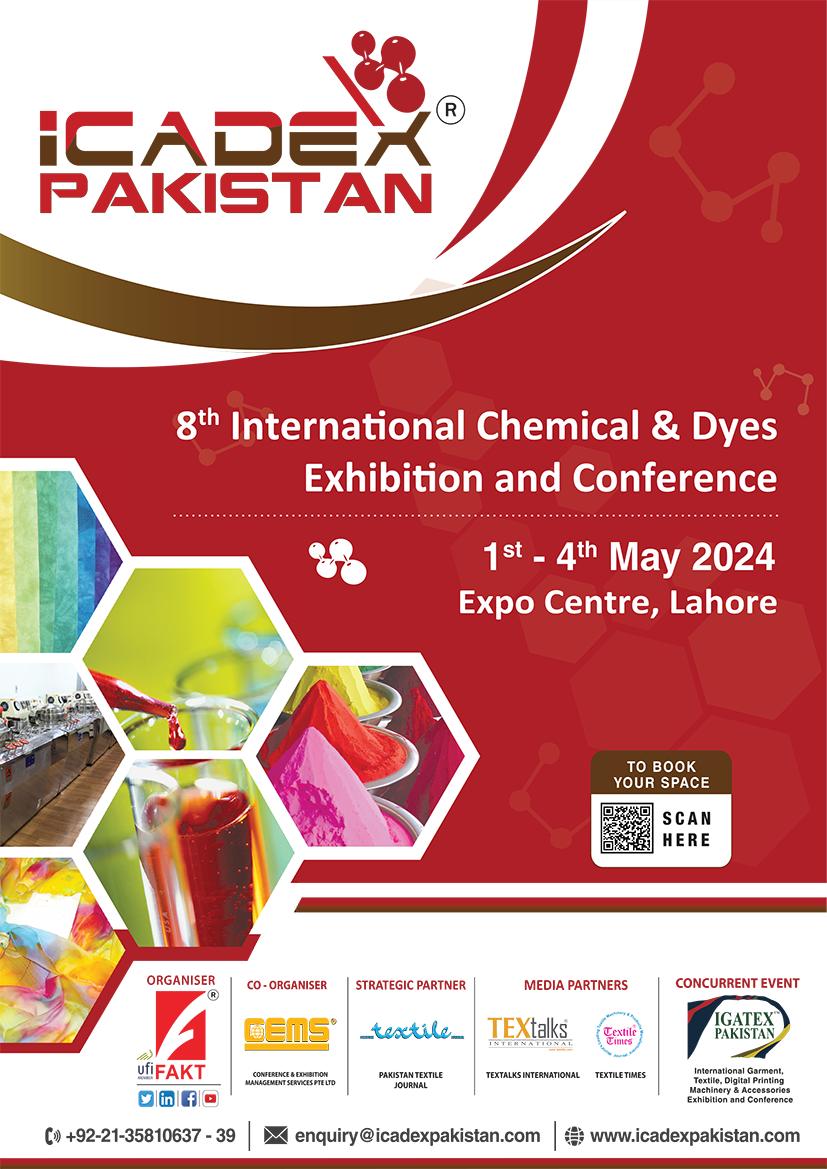
KARL MAYER GROUP mastering the future with sustainability
The KARL MAYER GROUP is a family business with a long tradition and a strong sense of social responsibility. In its corporate strategy, it commits to act in line with social and ecological goals and to orienting itself towards the "Environmental Social Governance (ESG)" standards.

With a focus on a future worth living in, the KARL MAYER GROUP ensures sustainable processes above all with its products and services.
Sustainability will be the overarching theme shaping the KARL MAYER GROUP’s presentation at Hall 4, booth B119. A compact sustainability gallery will feature elements including an example of the circular economy of material from the warp knitting sector, a 3D-knitted garment with extremely low-waste production, and a technical warp knitted grid fabric that offers two environmental benefits in one: not only is it made from natural fibres, but it is also used as a carrier material for CO2-effective vertical urban greening.
Other features of the sustainable innovations collection revolve around production technology. Various demonstrations will address topics such as how energy consumption can be monitored and managed in the warp knitting industry, while the denim industry can look forward to a solution for indigo dyeing that has an extremely low carbon footprint.
In addition to the focused performance show, ITMA visitors will see the theme of sustainability reflected at almost every turn around the rest of the KARL MAYER GROUP’s stand. Under the motto “Master the Change – profitable, flexible, sustainable”, solutions and innovations are provided to answer our customers’ key questions, including: “How can I deal with the increasing pressure to be more sustainable?”
One potential way forward for warp knitting is shown by a new fall plate raschel machine, which – thanks to
specific modifications – is suitable for processing staple fibres. The resulting warp knitted textiles are not only chic but also sustainable, meeting the growing demand for clothing with a low ecological impact.
A high-performance tricot machine operates using an energy-efficient direct drive. In doing so, it uses pattern data from the cloud rather than pattern discs, thereby reducing its material and transport intensity. A warp knitting machine with weft insertion demonstrates how an optimised weft carrier can save waste in the weft yarn, and STOLL’s ADF model requires less energy thanks to a range of targeted design changes.
Digital solutions also contribute effectively to increased sustainability and economic efficiency at the same time. As an example, the latest innovative design software for flat knitted textiles –
k.innovation CREATE DESIGN – can interact with any 3D software. Thanks to this connection, realistic 3D renders can be created, thereby enormously reducing the need for physical patterns and by extension, lowering material consumption.
In addition to the exhibits, the ambience in which they are presented will also reflect an air of sustainability. The focused stand concept relies on minimal material consumption for the wall and floor structures through the use of many modular and reusable components, without compromising on hospitality and clarity. Transport routes will be minimised by working together with an Italian stand builder, while attention is also being paid to reducing catering-related waste, such as by using reusable crockery and avoiding packaging where possible.
58 PAKISTAN TEXTILE JOURNAL - May 2023
German Review
DiloGroup: MicroPunch line
Dilo will present on a floor space of 750 m² “MicroPunch” - a complete production line for intensive needling at hall 10, booth A 201. This will be the first time worldwide that an industrial MicroPunch installation will run with fibre to show the industrial exploitation of Dilo MicroPunch technology for needling fine and lightweight fleeces to be used in hygiene, medicine, apparel and other applications.
The good abrasion resistance of the intensely needled material suggests further application fields apart from medicine and hygiene, such as apparel, artificial leather, battery separators and filter media.
The production of personal care, single use wipes with a weight range between 30 and ca. 60 g/m² made of fine fibres, often with blends of polyester and viscose, has been up to now a domain of hydroentangling technology. As this product is a typical disposable, it is in the focus of sustainability and recyclability. For this reason, biologically degradable fibres are a goal for more environmental sustainability.
Furthermore, the evaluation of the consolidation technology with regard to a low carbon footprint and minimum use of energy for the production is another decisive factor.
The classical needlepunching technology and its use for the production of lightweight fleeces at low cost per kilogram of nonwoven has been proven
technologically and economically over many years of research and development work. This has been made possible by a high density of needles in the board, and by very fine barbs on specialty needles which allow economic loading and a fast exchange based on the new module technique.
Compared to hydroentangling, the “MicroPunch” needling line allows a reduction of the energy consumption (electricity and gas) of about 75 % based on the complete installation.
Given recent increases in electricity and gas costs, this reduced consumption has a great impact on the total costs per kilogram of finished material in some countries, even at the lower production speeds of needling technology.
A MicroPunch line consists of DiloTemafa components for fibre preparation, a DiloSpinnbau universal or random card and three MicroPunch specialty needlelooms for pre- and finish needling as well as a winding unit.
At ITMA in June, the presentation of a complete production line in 2.5 m working width is planned. After the show, this line will be installed in the Dilo Technical Research Centre for trials, product development and presentation.

DiloGroup invites you to become acquainted with the details of this innovation during ITMA and looks forward to the visit of customers and interested parties from around the world.

59
German Review
SETEX is shaping the future of Industrial Automation
SETEX will introduce its integrated turnkey solution for the factory of the future, providing cutting-edge technology designed to maximize production efficiency, resource efficiency and reduce carbon footprint.
SETEX expert are present at the ITMA Exhibition in Hall 11, Stand: A302, and will highlight how SETEX's integrated turnkey solution can enhance business operations. Some of the show highlights are as follows:
The symbiosis of SETEX E390 controllers and OrgaTEX X2 MES platform enables a new dimension in exchange of data and functions.
The SETEX E390 controllers offer realtime KPIs, intuitive mobile-like swipe usability, web visualization, and IoTfunctionality via OPC-UA.

The OrgaTEX MES platform provides intelligent production designed specifically for finishing companies, enabling agile process optimization with web-based access for software planning, scheduling, business intelligence analytics and supply chain transparency.
SETEX' 30-year commitment to innovation with a passionate customer
focus has helped its automation solutions emphasize intuitive operation and easy integration into the customer's production environment.
By partnering with the world's leading providers of color management and ERP solutions for the textile and apparel industry, OrgaTEX offers its customers state-of-the-art technology, expertise and customized solutions from top experts to meet their specific needs and requirements, resulting in greater efficiency, productivity and profitability.
SETEX helps machine builders and textile finishers to realize production efficiently and sustainably. As a one-stop

supplier of manufacturing operations management software and controls for textile machinery, SETEX offers a unique combination of smart applications and IIoT technology for sustainable production efficiency.
The product portfolio is rounded off by a range of sensors and camera measurement technology that are matched to the integrated workflow. Being family-owned and operated, SETEX stands for quality, long-term availability and sustainable innovation. With R&D facilities in Germany and representatives in 65 countries, SETEX is a full-service provider for consultancy, sales and modernization.
60 PAKISTAN TEXTILE JOURNAL - May 2023
German Review
Mahlo highlights latest developments for process optimization
German machine manufacturer Mahlo GmbH + Co KG will present its latest developments for process optimization and increasing productivity and saving costs at the same time: visitors can see how this is possible at booth H18C108.
"Textile machinery manufacturers and textile producers are working ever more closely together to create a more sustainable future for the industry," says Mahlo Head of Sales Thomas Höpfl. His company is just the right partner for this, he adds. The broad product portfolio in the field of measurement, control and automation technology covers almost every textile application. "Thanks to our modular system architecture, we find individual solutions for our customers to optimize their production sustainably."
Straightening machines
For almost 80 years, the name Mahlo has been synonymous in the textile industry with high-quality automatic
straightening machines and process control systems. Mahlo also intends to set the highest standards in distortion detection and correction with the new Orthopac RXVMC straightening concept, which will be presented for the first time in Milan. The system can remove distortions in textile fabric webs even faster and more precisely.

Process control and QMS
Process control systems are a must in modern textile production. They not only ensure quality, but above all contribute to the efficient use of the machines. Thanks to control of exhaust air, fabric temperature, dwell time and moisture, only as much energy and raw material is consumed as is really needed. Also on show in live operation are the Patcontrol PCS for pattern recognition and the Famacont PMC for controlling weft and stitch course density. Both systems help producers to maintain the residual shrinkage values they guarantee. Interested parties can get an explanation
of how they work at the Mahlo booth, and fabric samples they bring along can be tested on site.
Digital and Industry 4.0
Another major topic remains Industry 4.0, because the best measured data is of no use if it cannot be utilized. Mahlo has continuously developed its digital environment mSmart. "Our systems generate data that the customer can use immediately to regulate goods on-line. At the same time, all measured values are backed up in our data management system mLog enhanced and can be retrieved at any time. With this historical data, processes can be optimized and weak points in the process can be minimized," explains Sales Manager Thomas Höpfl.
And of course, there is one thing that a Mahlo booth at ITMA cannot do without: the Mahlo Bistro. Here, visitors can enjoy Bavarian specialties and recap in peace how their production processes can be effectively improved.
61 German Review
Thies: Signature technology transforms dyeing
Thies will exhibit the Signature Series, at Hall H11, booth B208, thus opening a new chapter in fabric coloration for the first time. Signature technology transforms dyeing as we know it, but it is plug-in ready for existing dye houses.
With its novel ability to precisely dose concentrated chemistries and flexibly use less water to transport fabric, the Signature Series is capable of delivering highly consistent results with liquor ratios starting at 1:2.3 liter of water per 1 kg of fabric. Proven in bulk production, water consumption is reduced, with improved dyeing uniformity and shorter batch times.

Signature‘s ultra-low liquor ratio has further multiple cost and environmental benefits. Dye consumption is reduced up to 20% while achieving the same shade, less energy is required for heating water, and the treatment of water is less costly because the total dissolved solids (TDS) is reduced upto 50%.
Unlike pad or spray dyeing, with Signature there is no need to have separate machines for washing, bleaching and dyeing because nearly all wet treatments can be carried out on this single machine. There is no intermediate handling and drying, and there is no endto-end variation associated with wet-on-wet pad-bath dilution.
Color uniformity is improved over pad dyeing because fabric passes through the nozzle 60+ times versus a single nip, and there is no side-center-side variation caused by pad roll wear or crowning. A wide array of fibre types and fabric structures can be successfully processed, including woven fabrics, warp knits, spacers, and circular knits.
In short, the Signature Series has the proven advantages of batch dyeing while competing with the low liquor ratio of single-pass applications. The ease with which Signature technology fits into existing production lines means payback on investment starts on day one.
Transparency and Digitalization
Thies offers several tools for digitalization, reporting, and process control. Energy Control, pH-control, conductivity measurement, and DyeControl are tools for optimizing recipes and process settings. Visual representations of the process curves enable both a control of the turbidity and a determination of the dye extract from the liquor. Thies measures the process and provide intuitive reports that aid decision making in high quality dyeing.
Automation
The need for automation is evergrowing, and its advantages are diverse. Automation offers increased productivity through reduction of wait times, stable quality, improved occupational safety, a more inviting workplace, and freedom from constraints caused by labor shortages.
An automated storage, weighing and dispensing system for dyestuffs and / or auxiliary chemicals comes with many advantages:
Workers no longer have routine contact with chemicals and dyes during weighing, transportation, dispensing, and dosing.
Tasks that do not add value are elimi-
nated, and the workplace is safer. The dangers of falling or spilling chemicals and dyes are minimized, protecting workers and the environment from harm.
The digital storage system manages the exact stock levels and generates order proposals if the stock falls below the defined safety level.
A supervisory production planning system, centrally hosted, controls the process organization of the complete dye house by bidirectional communication. The MPS systems (Multi Product Supply systems) monitor the delivery destinations (tanks). The synchronization ensures an optimal process and production sequence. MPS systems integrate themselves seamlessly into the concept of a future-oriented, efficient dye house, delivering large increases in productivity and quality.
At the same time, the automatic weighing, dissolving and provision of dyes and chemicals leads to increased dyeing quality results, maximum reproducibility, savings of human resources, significantly increased occupational and environmental safety, as well as optimized consumption of products.
Today, there are solutions for smaller dye houses that work self-sufficiently, and
62 PAKISTAN TEXTILE JOURNAL - May 2023 German Review
modularity offers a manageable, affordable, step-wise improvement for larger dye houses.
As a system provider, Thies also offers holistic solution concepts. An example is the automated loading and unloading of package carriers. The package carriers are prepared automatically using intelligent robot technology, so that there are no waiting times and the time-consuming and physically strenuous manual work is no longer necessary. In addition, the yarn packages and locking devices are loaded and unloaded or locked much more gently.
Thies automation solutions are no longer limited to the dyehouse, the company also offers custom solutions for fabric finisher and the coating industry.
Circular economy
Wastewater and its thermal energy are valuable resources. Thies has an ozone system in its portfolio that can be used to decolorize colored waste water. The use of active oxygen splits the organic and inorganic impurities. The oxidized dye molecules become colorless. The result is a colorless solution which can be recycled for reuse in the process.
Heated waste water is a regenerative energy source. Transferring its energy to cold water reduces primary energy consumption as well as CO2 emissions. The use of Thies‘ intelligent heat recovery systems enables a significant reduction in production costs and makes a major contribution to efficient, clean and energy-saving production.
In addition to global market forces, the European Green Deal demands that, by 2030, textile products placed on the EU market are long-lived and recyclable, to a great extent are made of recycled fibres, are free of hazardous substances, and are produced in respect of social rights and the environment. With expertise in industrial-scale production of pressure vessels and automated material handling equipment, Thies supports solutions for both removal and re-dyeing of recycled fibres and yarns.
KERN-LIEBERS Textile at ITMA-2023
The ITMA 2023 international textile machinery exhibition will be held in Milan from June 8th to 14th and promises to be one of the most important events in the industry. KERN-LIEBERS Textile, one of the leading suppliers of components for textile machinery, will also participate in the show in Hall 4 Booth D203.

KERN-LIEBERS Textile will present its latest developments and products at ITMA 2023, including innovative solutions for the textile industry. Visitors to the booth can look forward to a wide range of products for knitting, hosiery and spinning machines. Likewise, this show will provide an excellent opportunity to network and exchange ideas with customers and interested parties.
ITMA 2023 will also feature a series of seminars, workshops and conferences focusing on the latest developments and trends in the textile industry. These events provide an excellent opportunity for Kern-Liebers Textile to learn about the latest developments in the industry and exchange ideas with other experts.
Overall, ITMA 2023 is a must-attend event for anyone involved in the textile industry, and Kern-Liebers Textile is proud to be a part of this important event.
Trends come and go we at KERNLIEBERS Textile have followed only one trend for decades: The development of
ultra modern solutions for textile machines which function reliably. One needs experience and drive to continuously set new standards in technology. That's what we're made of. That makes us a strong partner.
Constant Progress
At KERN-LIEBERS Textile today, we are already working on the technologies of the future - and ensure that our customers are always a step ahead. We constantly try new processes, procedures and materials in order to offer you the best possible quality.
We not only derive stimulus from our business partners, but also the enormous innovation power of the entire KERNLIEBERS Group.
Combined Skills
Four specialists with many years of experience - KERN-LIEBERS Knitting Parts, Saxonia Textile Parts, the Bayerische Nadelleistenfabrik Paul Leistner as well as the Sachsische Nadelund Platinenfabriken all belong to KERNLIEBERS Textile. Our extraordinarily broad range offers our customers products which fulfill nearly all needs, in addition to a global service network.
Contributed by KERN-LIEBERS Textile.
63 German Review
ADVERTISERS INDEX MAY 2023


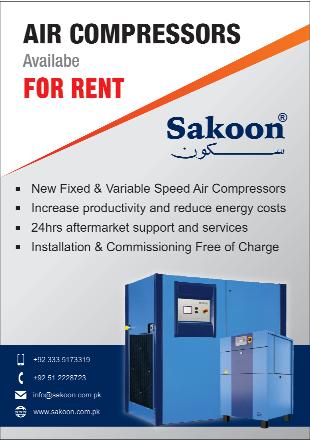
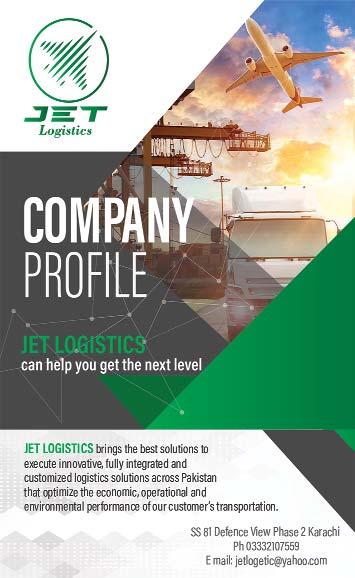
ACIMIT Servizi Srl........................................................1 Accotex......................................................................37 Al Ameen....................................................................BC Archroma Pakistan Ltd...................................................IBC Arosa Systems............................................................19 Brueckner...................................................................13 Chhipasons.................................................................64 CCI USA...................................................................IFC ITMA 2023................................................................33 ITMA ASIA + CITME 2023..........................................49 ITM 2024....................................................................35 IGATEX Pakistan 2024................................................39 ICADEX Pakistan 2024................................................57 iTextiles.......................................................................29 Jet Logistics................................................................64 Loepfe........................................................................15 MS Printing Solutions....................................................9 Picanol..........................................................................3 Rastgar................................................................ 6 & 64 Savio...........................................................................23 SPGPrints....................................................................27 SSM AG......................................................................17 The Textile Institute....................................................31 Truetzschler................................................................FC Uster Technologies......................................................11
Classified
































































































































 A first T-SUPREMA needle-punching line.
A first T-SUPREMA needle-punching line.

































































